#our skyy: bb
Text
THIS IS A CALL OUT POST
I am calling out Pran's complete and utter fakery right here:
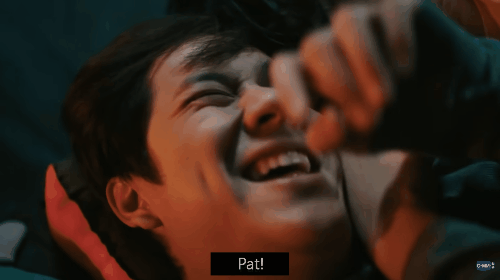
"I want to sleep" - yea, right, Pran. You are a little liar who lies and I am going to prove it.
Exhibit A:

You've already admitted that you need your Nong Nao eye mask to sleep and do indeed wrestle back off your boyfriend and put it on to fall asleep. We know this is a regular routine for you as we saw you also wearing it for bed in the previous episode so we can assume that this is entirely true.
However!
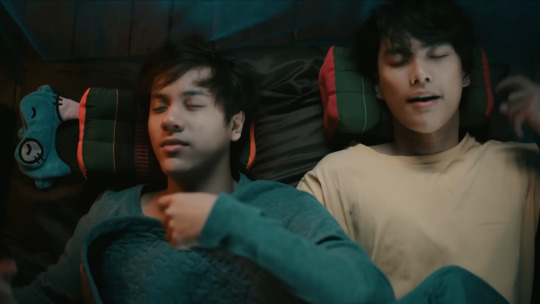
When you lie down to "go to sleep" after your little teasing roleplay as chief and volunteer teacher, the eye mask is right next to you and yet you make no attempt to put it on. It's there, all prepared for your night's sleep, but you deliberately choose not to place it on your face. Hmm...

Here again, after your little heart-to-heart about Pat wanting to help you and you finally giving into him. You turn away but you still do not put on the mask. You're acting as though you're ready to head off into the land of Morpheus and Pat even falls for it, doesn't he? Wiggling in closer for cuddles...
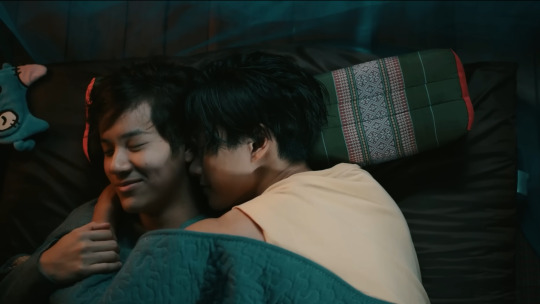
Look at you snuggled up with the love of your life. So cute. So darling. So completely ignoring your Nong Nao eye mask which you proclaim to need for sleeping!
You've even got a smug, little smile on your face. It's not just because your bf's being cute though, is it Pran? It's because you're waiting for him to figure out.
Which he does.
Riiiiiiiiiiiiiight-

-here!
And there's the reason Pat's eyes pop open like a doll in a horror movie! HE'S REALISED YOU'RE NOT WEARING YOUR SLEEPING AID. He's realised that you're not interested in the sleeping AT ALL!!!
So protest all you want Pran - you engineered this whole thing from the start!
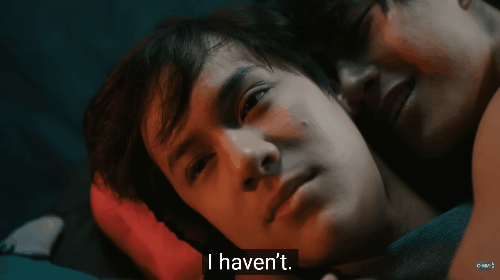

Liar.
#ok obviously this whole thing was made in jest#but it is sus though#bombastic level side eye at you pran#bad buddy#patpran#our skyy 2#our skyy x bad buddy#our skyy: bb#bad buddy brain rot#bad buddy crack
862 notes
·
View notes
Text
The fact that we only see Pran make one call but later there's like multiple calls on Pat's phone (and we can only assume its before Pran got angry at the implication that he's useless without Pat) so I guess my point is
PRAN IS A CLINGY BABYGIRL. AND WE LOVE THEM FOR IT.
57 notes
·
View notes
Text
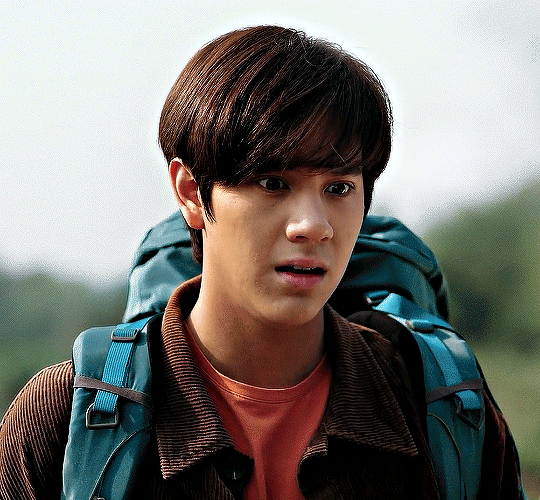



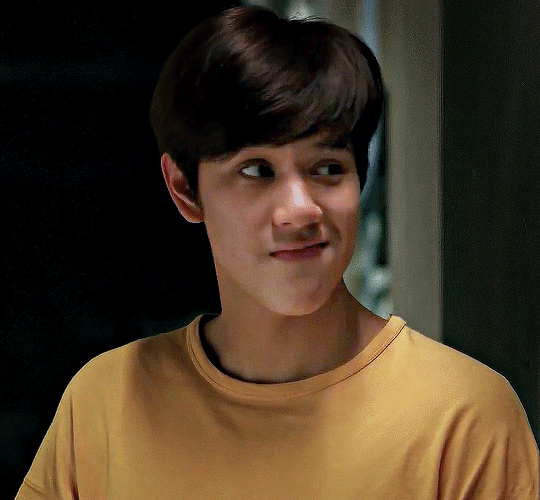
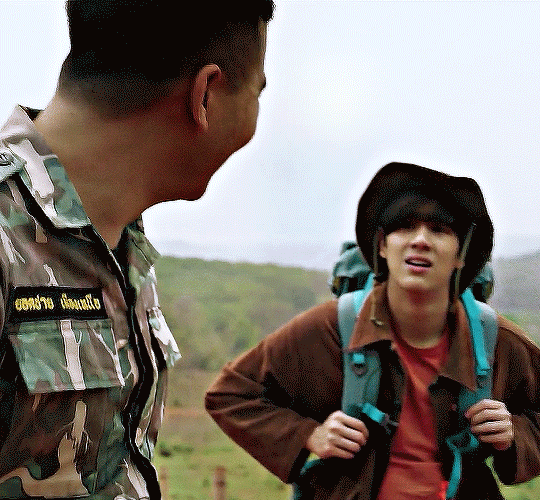

Do you think those eyes will make me give in, Dimples?
Nanon Korapat as PRAN PARAKUL
↳ [EP01] Our Skyy 2 x Bad Buddy
#bad buddy#our skyy 2#nanon korapat#pran parakul#userconcrete#userkit#tosnimeat#tonanons#userlotad#userjjessi#usernuria#*#bb*#os2*#jesus i'm never doing big gifs again#so hard to make them look nice#anyway- vanity blorbo set anyone?
824 notes
·
View notes
Text

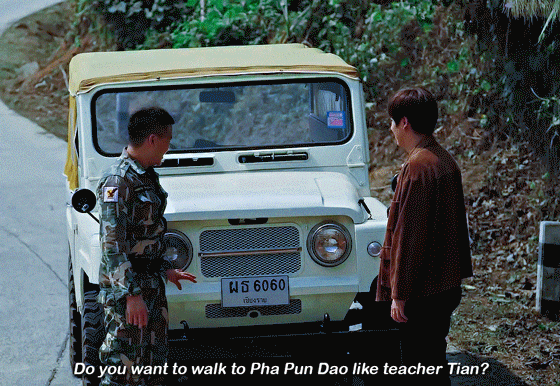
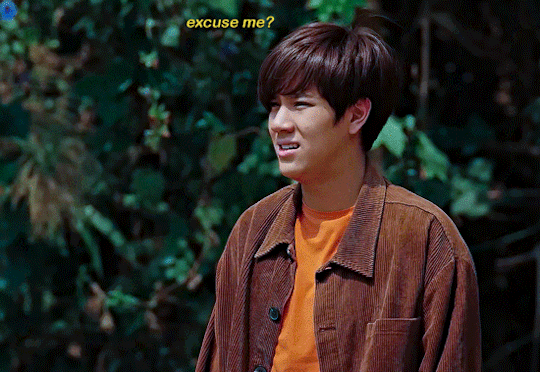

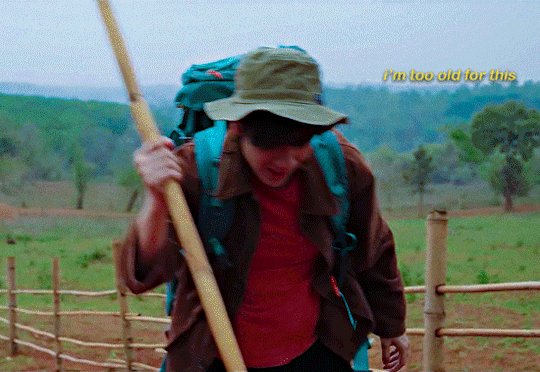

Pran Parakul and his 1000 stages of suffering.
#our skyy x bad buddy#our skyy 2#bad buddy#os2#bbs#pran parakul siridechawat#pran#nanon korapat#asianlgbtqdramas#thai drama#gmmtv series#vx:gifs#vx:tv:bb#vx:t.edits#it had to be done#quality is garbage ngl#idk if i have forgotten how to gif or tumblr kills quality now#but it is what it is
764 notes
·
View notes
Photo

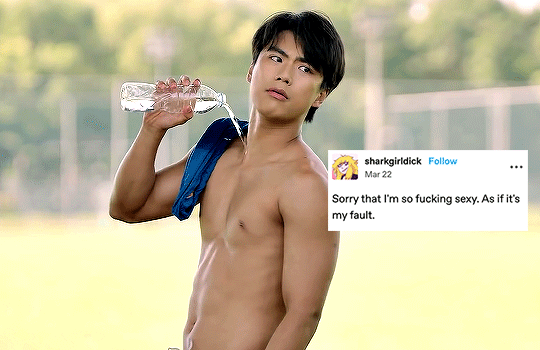



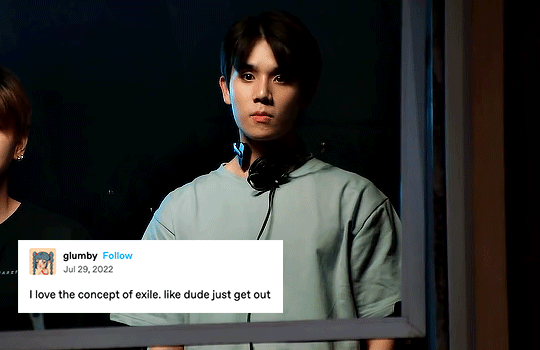

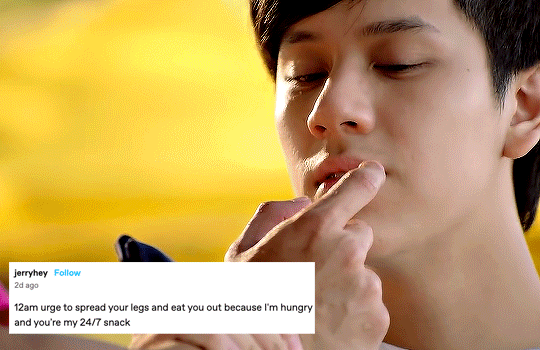
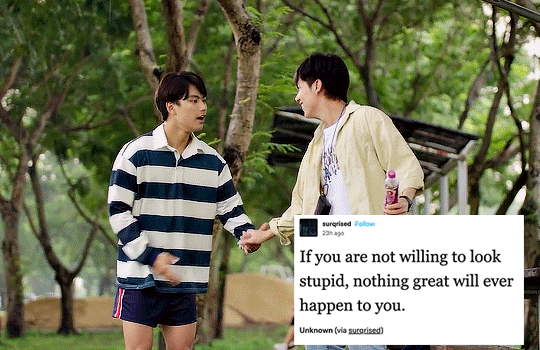
6 days for the Our Skyy 2 Bad Buddy Preview and 12 days till PatPran come home! (Non-Crack Version)
#our skyy 2#os2:bb#bad buddy#ohm pawat#nanon korapat#drake laedeke#jimmy jitaraphol#milk pansa#love pattranite#userdramas#asiandramasource#asiandramanet#asianlgbtqdrama#asianlgbtqdramas#vishingwell#becauseigtf#userjjessi#mine#mine:bb#my gifs
813 notes
·
View notes
Text
Bad Buddy x ATOTS aka Damn You WMT
Dear @waitmyturtles, fuck you, respectfully wen-kexing-apologist. Turts, I have shit to do, I do not have time for this. But once again I CANNOT STOP THINKING ABOUT IT SO, FUCK ME I GUESS WE’RE DOING A FOREST EPISODE.
More specifically, we are doing an Our Skyy 2, Episode 15 Part 1/4 post, probably far earlier than I should be, and definitely instead of doing work I absolutely need to be doing. But Pat and Phupa’s interactions in this part of the episode have me thinking about Phupa and his relationship to queerness.
I don’t know about anyone else, but I had a marvelous time watching Part 1 of our latest Bad Buddy x ATOTS crossover episode. Why? Because it is absolutely incredibly fun to watch Pat personally terrorize the local gay elder.
What I have really been enjoying in these crossover episodes is watching the ways the similarities and differences in Phupa, Pat, Pran, and Tian play out. Each person spends most of the time paired with the character who play the same role in the relationship but whose personalities and approaches to their relationships are very different. Phupa is the support in his relationship with Tian, Pat is the support in his relationship with Pran, but Phupa never bends and Pat always gives in.
The thing I love about Pat is that he is unabashed in his queerness, he rolls up on to the scene and starts flirting the second he opens his mouth, and then he
Literally
Never
Stops
He annoys Pran, he tests the structural integrity of the house with Pran, sure, but he also wakes up next to Phupa and then proceeds to never let Phupa forget that a) he would and b) that they thought they might have.
He rolls up on the scene as Phupa and his coworker are getting ready to head into the forest, and he starts talking openly and loudly about Phupa’s boyfriend, and the relationship problems they are having.
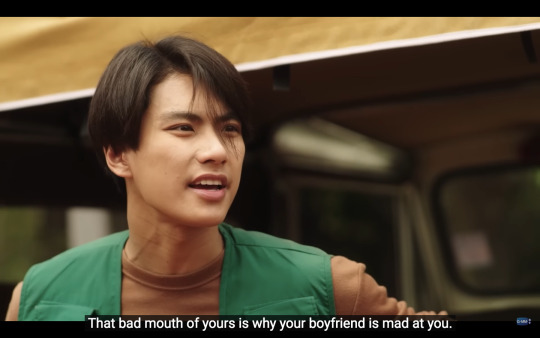
Phupa is less than amused.
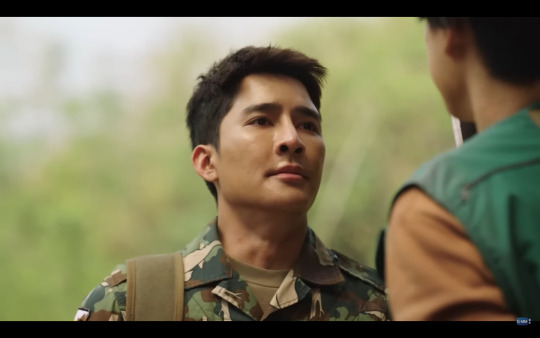
Phupa does not want Pat coming with him, Pat sneaks into the back of the truck, Phupa begrudgingly allows Pat to come with him and Pat says “you’re the cutest”
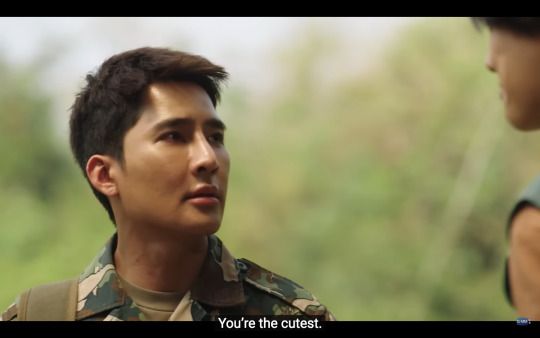
Phupa is less than amused.
I’m gonna skip ahead a little bit and then regress if that is okay with everyone, after Phupa puts bandaid’s on Pat says yet again “what a cute print, Chief”, “you have a cute side, Chief”
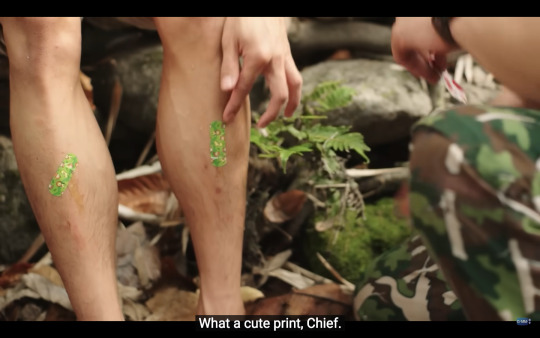
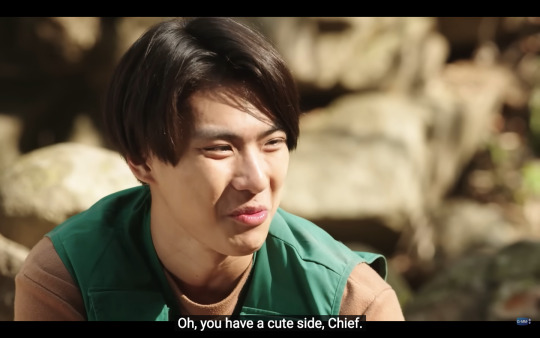
“No wonder teacher is head over heels for you,”
Here Pat is, one half of the first queer couple to interact with Phupa and Tian in god knows how long or possibly ever, talking casually, happily, loudly, and openly about Phupa’s relationship with Tian and Tian’s feelings for Phupa. Reaffirming to Phupa in a way that it is obvious that Tian is in love with him.
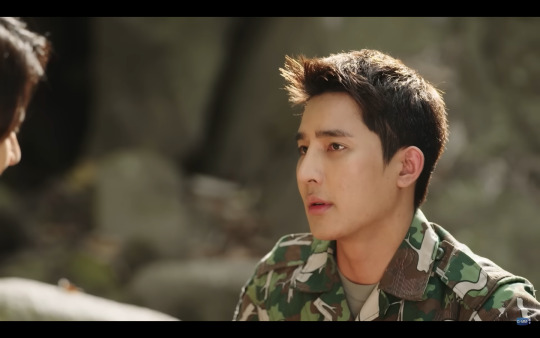
And still Phupa is not having it.
As they continue their walk, Pat starts smelling the trees and Phupa is like oh jesus fucking christ what the hell are you doing you are making my life a living hell- “What are you doing?”
And in response, Pat is very open and sappy about Pran.
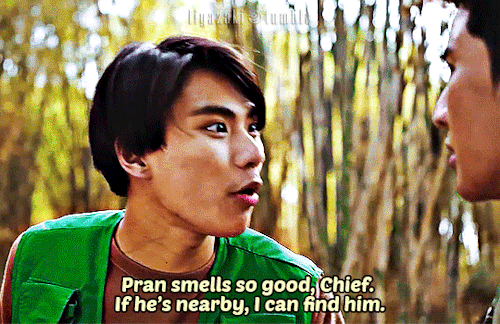
gif from @liyazaki
“Pran smells so good, if he is nearby, I can find him,” and Phupa is flabbergasted. He just stands there for a second, looking Pat up and down like “okay, seriously…what the fuck?” and he is so obvious about it in the way he looks at Pat and in the way he walks away, that Pat is able to tell immediately that Phupa is, once again, not vibing with Pat’s casual references to his queerness, or overt and honest love and admission of intimacy with his partner. Pat knows Pran’s scent so well that he is confident he could pick it up in the middle of the forest. That suggests a level of familiarity with a body that would traditionally be considered uncouth, if you were polite, and doubly so if you are queer.
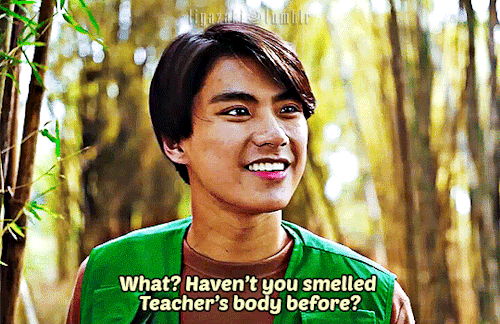
gif from @liyazaki
When Phupa starts walking like he’s over the conversation, Pat’s easy smile shifts to confusion “What? Haven’t you smelled Teacher’s body before?”
(Translation: Aren’t you also so in love with your partner, and aren’t you so intimate with your partner that you could recognize his scent anywhere you went? Looking at you watermelon soap sponsorship…looking at you tea bag smell pouch…)
And it’s the inclusion of the word body that really strikes me here, because to say “what? Haven’t you smelled Teacher before?” evokes a different relationship than “What? Haven’t you smelled Teacher’s body?” does.
“That’s too bad” Pat says, and leans suggestively close to Phupa. Like a cat toying with a mouse. Pat likes needling at Phupa’s discomfort around explicit references to Pat and Pran’s sex life. And while we know Phupa has most certainly smelled Tian’s body before, Phupa SPINS around, has this brief moment of absolute wide eye about being so blatantly asked a question that alludes to his physical relationship to and with Tian, looks Pat dead in the eye and says “I’m not a pervert like you,”
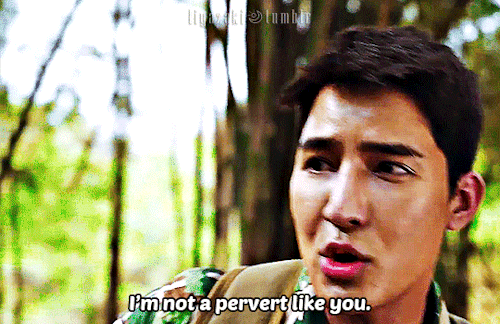
gif from @liyazaki
Harsh words. Incredibly harsh words, especially because of the connotations of queerness with perversion, especially because iirc from the KinnPorsche LGBTQ+ Facts special on IQIYI, pervert is often an insult used in Thailand for queer people. Phupa is uncomfortable with Pat’s open conversation about his queer relationship, about his queer intimacy and he chooses to meet Pat with homophobia in the way of a slur.
But Pat is having fun, and I honestly believe he expects that kind of reaction. Pat and Pran were awkward witnesses to Tian and Phupa’s little domestic about watching him shower and looking lovingly into their eyes, but Phupa is stiff the whole time, he is aware that he is engaging in that conversation while other people are present, and he can’t take it and he literally flees. And some of that is because he is getting riled up about their fight, but we see in part 2 of this episode that when Phupa is actually angry with Tian about something, he has no problem standing up and planting his feet to confront Tian about it.
Anyway, Pat is having fun, and Pat wants to test Phupa and so, completely unphased he starts talking about how Tian smells, as if he is familiar. He is like "my boyfriend smells soooo good, do you smell your boyfriend's body? Your boyfriend smells good" and it’s a direct display of Pat's comfortability with his partner, their closeness, and their level of intimacy.
“Teacher Tian smells so good” Pat says with the world’s widest grin
“How do you know that?” Phupa asks almost challenging
“I thought you said you’d never smelled him”
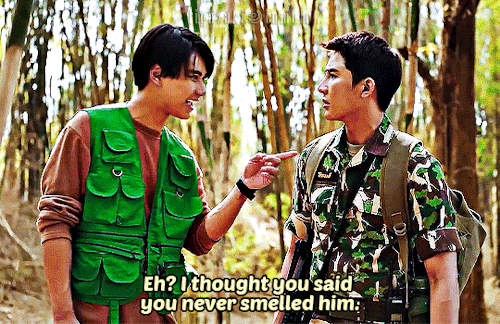
gif from @liyazaki
Caught ya. Phupa has indirectly admitted to intimacy. Pat has successfully engaged Phupa in a conversation that is completely about Phupa’s queerness.
And as Part 2 goes on, we are made more and more aware of how little outward public affection Phupa and Tian engage in. If Phupa and Tian touch around other people, there has to be a legitimate reason to do so (Tian fainted, Tian fainted again, Tian fainted a third time, Tian is drunk, Phupa is drunk, etc.). In this episode, Tian is weak and almost collapses in to Phupa’s arms because he exerted himself too much with his heart. Phupa’s hand is on Tian’s back and then Tian is away from him and standing upright, and when Phupa, Tian, Pat, and Pran exit the forest and enter the clearing of the safe house.
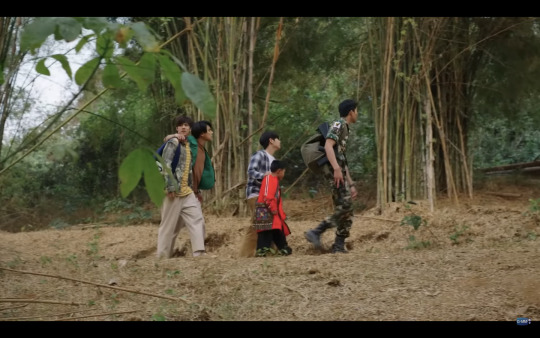
Pat is using Pran as a crutch, and Phupa and Tian have placed a child in between them. They are not touching, they aren’t even standing all that close to each other. Phupa is in ranger mode, sure, but he’s not really in front of people he has to impress, he doesn’t have to be completely professional and on guard when they are in the shack together. Especially when his partner with a body that is currently trying to reject his heart, is sitting there looking on the verge of a heart attack.
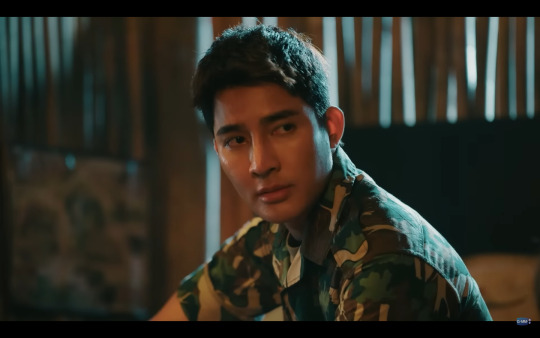
Phupa is making direct eye contact with Tian here, he is worried about Tian here, his focus is on Tian here, and yet he does not offer any physical comfort. No reassuring touch, no forehead kiss, hell, not even a hand on the back of his head to check for fever. He’s focused on getting the radio working, which is incredibly important in case there is a medical emergency, but he does not spare a second to physically ground him and Tian. He can only look from a distance. Because there are other people around, there is a child around. Phupa can’t be seen engaging in homosexual softness, Phupa has to be seen as a forest ranger, doing his job, his actual job that involves rescuing his stubborn dumbass boyfriend from yet again getting lost in the forest, but does not involve him being in love.
Again, Phupa truly has no one here he needs to impress, he’s in a room with a child, his boyfriend, and a couple of nuisances that have shown him absolutely zero respect since the moment they waltzed in to his neck of the woods.
At dinner even, after things have settled down, Phupa still cannot bring himself close to Tian in front of prying eyes.
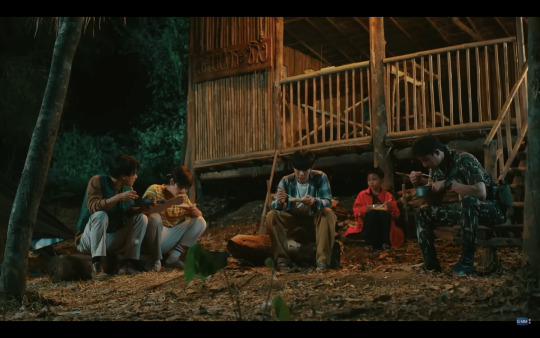
Pat and Pran? Literally sitting side by side, knees touching. They are as close to each other as they possibly can be without literally sitting in each other’s laps.
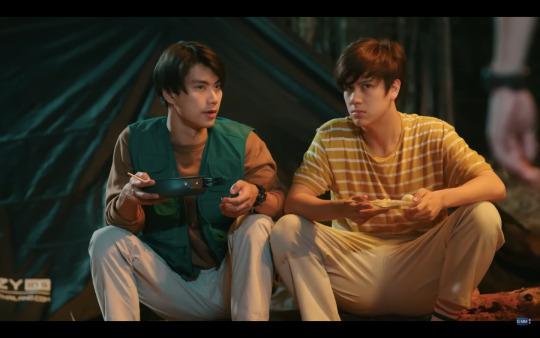
Here is a close up of Pat and Pran literally making physical contact with each other at the knee and at the elbow.
And what Phupa and Tian do not know, is that Pat and Pran can't be outwardly and openly affectionate to one another in public when they are at school and so they make up for it by being disgusting when they aren't in school. Pat and Pran have to keep up a pretense, and its a tragic undertone to their ability to diffuse the brewing Tian and Phupa fight by looking at each other, nodding, and then improvising a fight realistic enough to get Phupa and Tian to pull them apart.
Because Pat and Pran’s relationship at home is a metaphor for external homophobia, because they are so used to it by now, the having to hide, to pretend they don’t like each other, to pretend they are mad, to pretend they aren’t in love, that they can just ease right in to staged fights at the drop of a fucking hat. But even in their fake fight they wind up pressed up against each other.
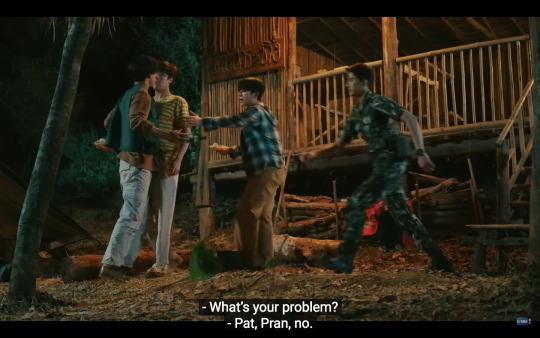
(hehe, screen shot funny, look at Phupa, he zoomin’)
Because for so long the only way they could have physical contact in public was by fighting, was by beating each other up, was by pushing or pulling each other away from a fight. Pat and Pran understand that Tian and Phupa are having a fight that they also once had, but they can also see the parts underneath it, the parts that make Phupa ask why the emphasis on him in Tian’s story is about Phupa being in love with Tian rather than his work.
Pat is simultaneously taking the opportunity of being hours and hours away from home, from where he has to hide his relationship, to be as openly and obviously in love with Pran as he has always been and is telling Phupa he is safe to be gay around. That he and Pran are safe people to be gay around, are safe people for him to be openly affectionate with his boyfriend around.
And that stems from the parts of Pat and Phupa that are wildly different.
Like, it is very very notable that Pat confesses his feelings for Pran practically as soon as he realizes that he has feelings for him and initiates the rooftop kiss which they share before they are even together, and then they have a bunch of little kisses, and they sneak as many touches as they can, and they make out multiple times in the show
And Phupa and Tian have…a single forehead kiss and then one kiss, at the top of a mountain, where no one would ever be able to see them after their story is complete.
In last week’s crossover episode, the level of intimacy that Phupa engages in with Tian is called out, even by Aof himself with the roleplaying scene between Pat and Pran where they pretend to be Phupa and Tian putting up a mosquito net and conclude that they absolutely must have kissed then.
But we know they didn’t. We know how painstakingly long it takes for Phupa and Tian to reach that level of intimacy with one another.
I'm even thinking backstory-wise, what is forest ranger training like? Is it part of the military? Did Phupa's gay ass have to enlist in a presumably male dominated field and like, go to training, and be around a bunch of guys, and make sure they didn't suspect he was gay?
I’m thinking about the moments in last week’s episode where it seemed like things were going better between Phupa and Tian, and it was always when Phupa was physically affectionate with Tian, putting his arm around him and not letting him go, when they were at karaoke, and when they were drunkenly stumbling home together, again locked in eachother’s embrace, where anyone could see them.
To regress as I promised back to the leech scene I am struck by what the approach to removing the leeches says about Pat and Phupa respectively.
Pat rips the leech off of him and Phupa takes time to put a lighter to them and pluck them off in a way that does not hurt Pat
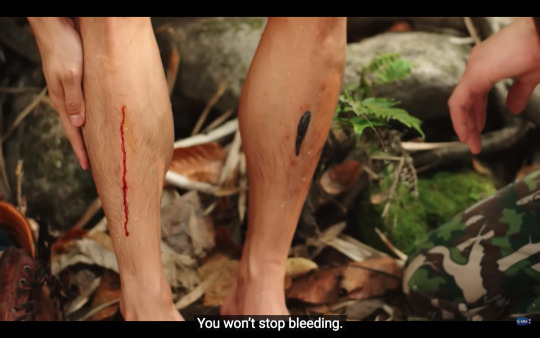
Pat rips the leech off and bleeding for it, hurting himself in the process, because he is impulsive and impatient, Pat bleeds emotion, he's practically incapable of hiding what he's feeling, and he must obey his emotions before all else. Therefore, in Bad Buddy Episode 5, when he realizes he has feelings for Pran, Pat immediately has to talk to Pran about his feelings, immediately leans in to the emotion he is feeling in the present moment, and initiates a kiss. A kiss that leaves him feeling blissful, and that leaves him hurt because Pran walks away, because Pran has known forever how much he likes Pat, because Pat has only just figured out his feelings, he hasn’t had to sit with them for long, and yet that kiss is an equally strong release for both of them.
When Phupa removes the leech from Pat’s leg he is methodical and patient, he tries to minimize the wound, it takes longer but it has the same result which is why it takes so damn long for him and Tian to get together. When I watches ATOTS and they touched pinkies under that blanket and I went "ah yes! This is the part where you start making out and fucking cause they are adults who have maybe been in a relationship before and who have both been obviously painfully aware of their feelings for eachother since the moment they laid eye on each other"...and then they don’t. Phupa waits, and waits, and waits.
I think the fundamental thing that I see replaying in this episode especially, and with Pat and Phupa’s interactions especially is the elder versus younger queer mentality we got in Moonlight Chicken, with very different characters from Jim and Li Ming, but following a similar pattern of restraint and time versus just jumping right in.
And it’s also why I think the conversation between Pran and Phupa is so important:
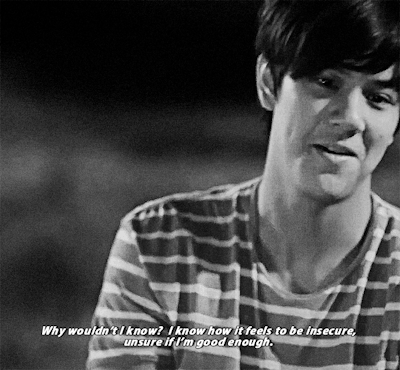
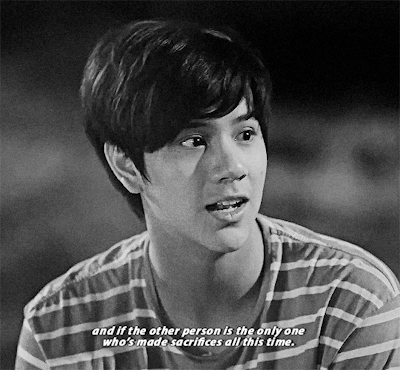
gifs by @nanons
Pat and Pran’s need to keep their relationship secret because of their family’s, and because of Pran’s mom specifically is a metaphor for external homophobia. Pat and Pran are extremely comfortable in their sexuality, very open in their love for one another when they are amongst other queer people, or amongst allies, when they are away from their hometown or when they are in the privacy of their homes.
There are a lot of different pieces in play around Phupa and Tian’s relationship, but there is ultimately a metaphor at the most or a blatant sense at the least of internal homophobia on the part of Phupa.
Pat has chosen to stay “in the closet” in order to be with Pran. In a convo with @shortpplfedup about this, Nini said it the most accurate and heart wrenching line: “It's honestly that Pran can't really ever compare to Pat's sacrifice here, and he KNOWS it,”
Similarly, Phupa believes that Tian has made a sacrifice to be with him, and he knows it. Which is why he can’t bring himself to go to Tian’s birthday, because Tian has left before, because he is scared every time Tian goes that he will realize that Phupa isn’t enough. Because Phupa is afraid of being seen as Tian’s partner. Because Phupa is really only capable of being physically affectionate behind closed doors. When they are completely alone.
Cause even in the camp, when the child is sleeping and Pat and Pran are off literally fucking in the tent minding their own goddamn business, Phupa cannot bring himself to touch Tian.
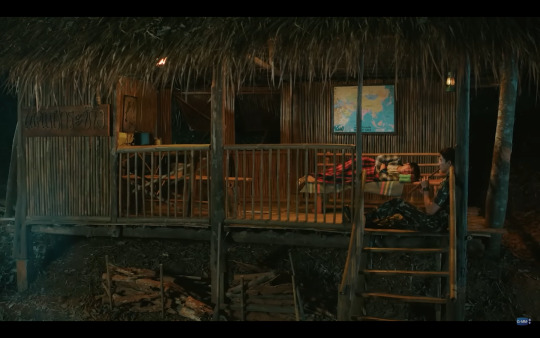
They’re sharing place but not space, or whatever it was that Ayan said to Akk in their Our Skyy 2 episodes. When Phupa gives Tian his medicine, at most their fingers brush, they don’t sit down together, they don’t ground themselves with touch. They share this place, but they do not encroach on each other’s personal space…
…until Phupa falls asleep
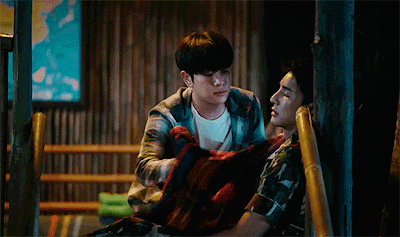
gif by @earthpirapat
At which point Tian gets up, and places his blanket on him, and physical touches his arm, his shoulder, etc. as he is adjusting the blanket for him.
Tian initiates the touch, Tian stayed in the village with him, Tian is sacrificing his health to be here with Phupa. Phupa has spent 90% of his time alone with the bouncing ball of sunshine that is Pat, and 5% of his time with the chaotic homosexual energy of Pat and Pran together, and to be real, as much as we know about Pat and Pran’s relationship, and as much depth as we are able to pull from these specific characters interacting in the way they do, Phupa has no idea what Pat and Pran have been through to be where they are.
To anyone who does not know Pat and Pran’s story, they seem like nothing more than two horny young adults in love, who feel no need to hide themselves and their queerness away, that have never had a struggle in their life, and do not understand the trials and tribulations of navigating an older queer relationship, who will last the length of a honeymoon period and then disappear at the first sign of real conflict. Thus, I think Phupa grossly underestimates the company he is currently keeping.
So I think, personally, Phupa is kinda of struck by the sudden and unexpected depth that comes from Pran. That Pran is able to identify and then absolutely hone in and strike at the exact things that Phupa is struggling with. As much as Pat has both relished in the freedom he has to be disgustingly in love with his boyfriend in the woods, and as much as Pat has tried to make himself an obviously safe person to be openly gay around, Phupa is incapable of understanding what he can learn from Pat and Pran’s relationship until he realizes these boys have a lot more in common with him than he thought, and that their relationship and their relationship to one another is more complex and therefore more similar to him and Tian’s situation than he would like.
Pran and Phupa carry the weight of feeling like nothing they do will ever compare to the sacrifices their partner has made to be with them. I didn’t get much in to Pat and Tian here, but their interaction makes it clear that they both carry the weight of feeling like their partner does not need them.
Phupa has literally saved Tian’s life on numerous occasions, Tian is chronically ill, Tian has limitations. Phupa is a forest ranger, who is a foundation in his community, who is skilled and competent, and fiercely independent. Pat is disorganized, and impulsive, his father is the reason he and Pran can’t be open about their relationship, he is the reason Pran got sent away.
We get a fun reversal with dynamics in these Bad Buddy x ATOTS episodes because Tian and Phupa are older, but Pat and Pran have an entire lifetime of navigating and overcoming conflict under their belt. Pat and Pran have already weathered the storm of the fight that Tian and Phupa are having. They have already settled in to who they are, but Pat and Pran (Pran especially) are able to see the ways that always giving in and never backing down wears on a person. Pran learns from seeing the pain that Tian is in that being uncompromising might cause fractures in their relationship in the future.
Tian and Phupa (Phupa especially) are learning how to resolve their conflicts. Pran, who is holding on to Tian and Phupa’s story so tightly because it is shared, because it is open, because anyone who wants to can know about it, pushes Phupa, who cannot cope with being portrayed as being in love with Tian, to read all of the diary Tian published online. Pran pushes Phupa to push through the emotional blocks, to push past his initial concerns, and to assume Tian wrote and published this story with both an understanding of who is partner is and what Phupa is comfortable with, and with no intention of hurting anybody.
Anyway, all of this to say, that this episode has really made me analyze Phupa with an internalized homophobia lens, and though one can never trust a P’Aof trailer, it has left me with two impressions.
On the subject of Phupa and internalized homophobia, and needing to move past that (and more) in order for his relationship with Tian to survive this fight, @shortpplfedup said it best:
“Now I'm thinking about one moment from the preview (but just a moment!) where Phupha tells Tian he's not gonna sneak to look at him, he's gonna OPENLY look at him”
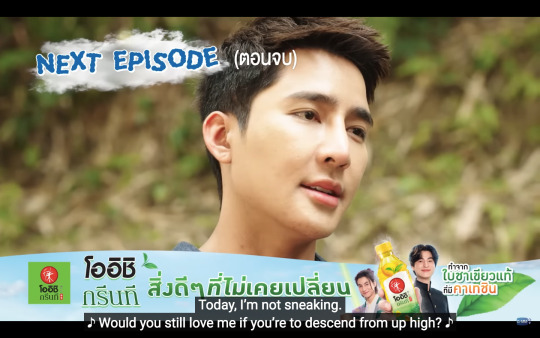
And cause it seems like Phupa learned some things from the Bothersome Boys:
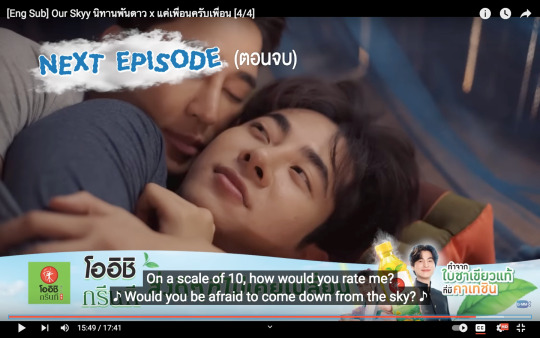
--
Case in point:
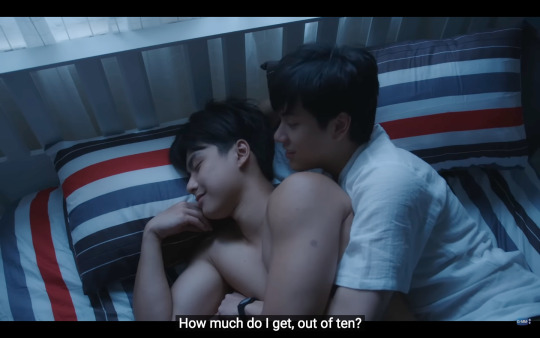
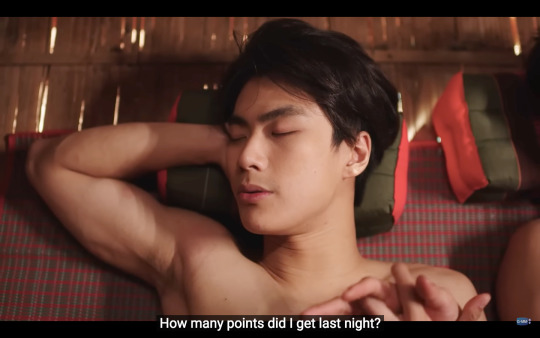
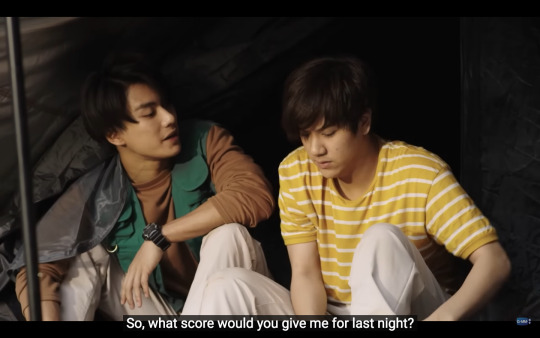
Here's multiple hours of my life I will never get back, at least I had fun! Time to go do the work I was supposed to be doing tonight :p
That's all folks!
#our skyy 2 x bad buddy#our skyy 2 x a tale of thousand stars#our skyy 2#our skyy 2 x bad buddy x a tale of a thousand stars#bad buddy#a tale of a thousand stars#atots#patpran#pranpat#nanon korapat#ohm pawat#ohmnanon#earthmix#earth pirapat#mix sahaphap#gmmtv#aof noppharnach#our skyy 2 x bbs x atots#phupha x tian#tian x phupha#pat x pran#pran x pat#thai bl#thai series#bad buddy analysis#atots analysis#bad buddy meta#atots meta#bbs analysis
586 notes
·
View notes
Text
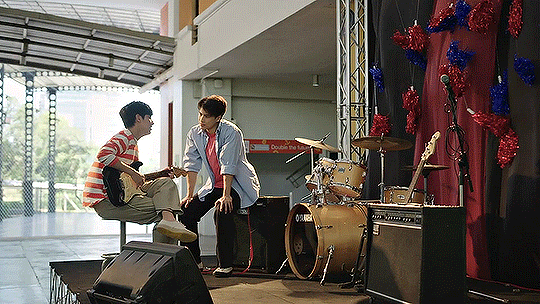
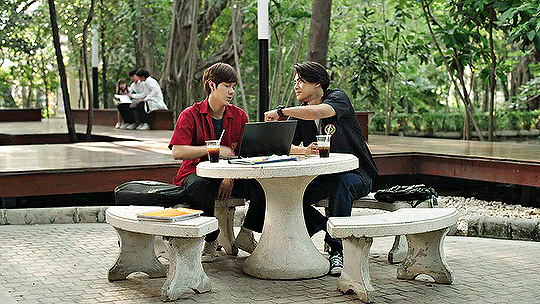
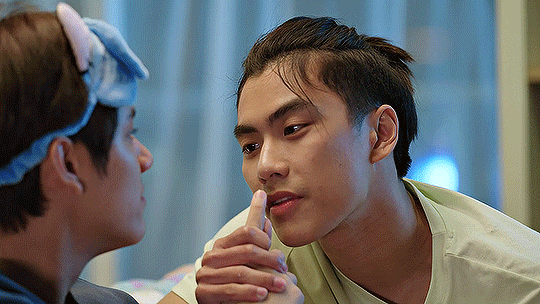
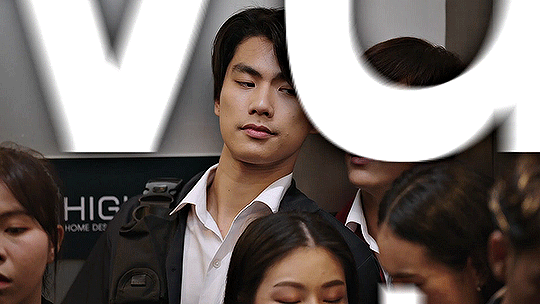


Pat & Pran in the Our Skyy 2 trailer

#THEM!!!! THEY!!!!! AAAAAH!!!!!#bad buddy#bad buddy the series#patpran#pranpat#ohm pawat#nanon korapat#ohmnanon#our skyy 2#gmmtv#lgbtedit#darcey.gif#darcey.txt#bl.gif#pat bb#pran bb#darcey.main#badbuddy.gif
931 notes
·
View notes
Text


boyfriend see, boyfriend do 2.0
#bad buddy#our skyy 2#patpran#thaidrama#asianlgbtqdramas#asiandramasource#bledit#ninisdarlings#userjjessi#userconcrete#usertaeminie#userrlaura#hipranparakul#userlovevivi#mjtag#nellsdani#badbuddyedit#*edit#[slaps roof of bbs our skyy trailer] you can fit so many parallels in this baby
504 notes
·
View notes
Text
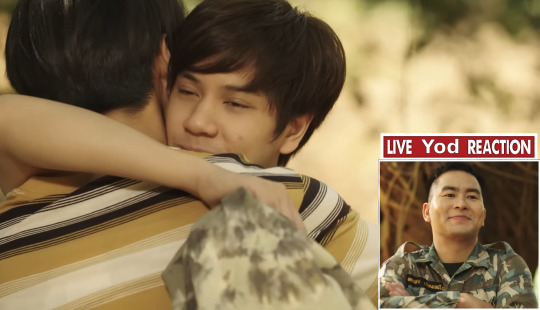
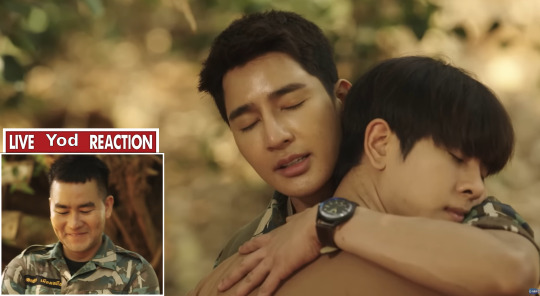
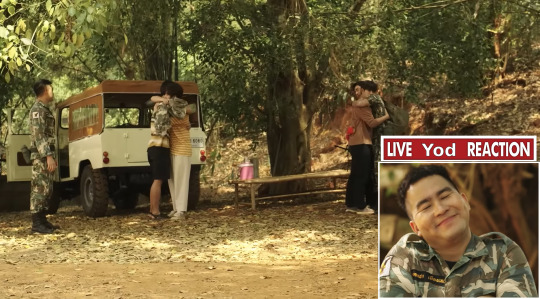
In which we are all Yod.
#our skyy 2#our skyy 2 x atots#our skyy 2 x bb#our skyy 2 x bad buddy#our skyy 2 x a tale of a thousand stars#phutian#a tale of thousand stars#thai bl#phupatian#phupha x tian#1000 stars#atots#bad buddy#bad buddy the series#patpran#bad buddy series#thai bl series#gmmtv#asian lgbtq dramas#asianlgbtqdramas#thaibl#thai series#thai drama#bl series#bl drama#thai bl drama#thai boys love#i am not good enough to make these gifs#i wish i was#but i absolutely am not
365 notes
·
View notes
Text
HAPPY PRIDE

202 notes
·
View notes
Text



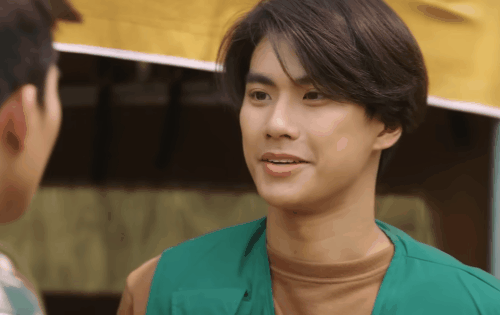
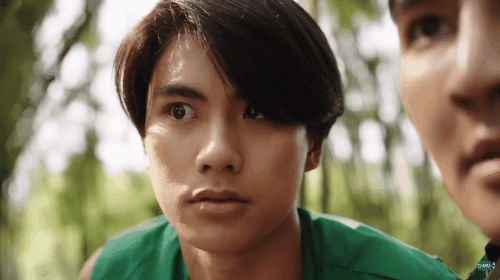
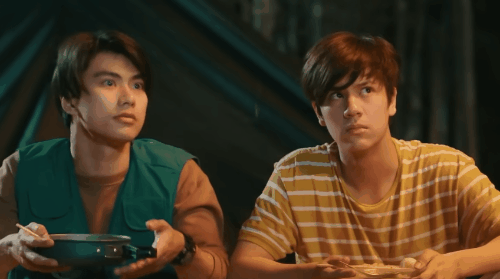

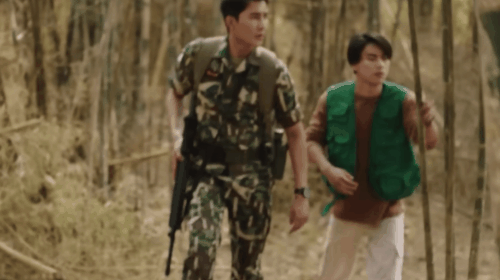

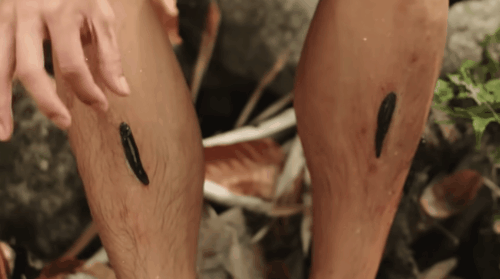
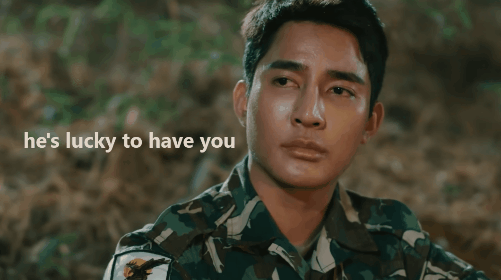
#Ok#OBVIOUSLY this is just a joke#usually I would not accept Pat slander in this house#however you gotta admit... from Phupha's perspective at that moment...#well.#anyway enjoy#my poor quality gifs#and judgy phupha#bad buddy#atots#a tale of a thousand stars#our skyy: bb#our skyy 2#our skyy x a tale of a thousand stars#our skyy x bad buddy#our skyy x 1000 stars#our skyy x bad buddy x 1000 stars#patpran#chief phupha#bad buddy crack#our skyy crack
397 notes
·
View notes
Text
Pain, Trust, and Separation in Some Asian Dramas (The Second Post In a Series of Utterly Un-scholastic, Highly Personal Big Meta)......
AKA, Turtles Catches Up With Old GMMTV: The Bad Buddy Rewatch Edition, Part 2 -- How Themes of Pain, Trust, and Separation Create Structure and Narrative in Bad Buddy and Other Asian BLs
[The following is a preamble I use for my Old GMMTV Challenge posts, here we go! What’s going on here? After joining Tumblr and discovering Thai BLs through KinnPorsche in 2022, I began watching GMMTV’s new offerings -- and realized that I had a lot of history to catch up on, to appreciate the more recent works that I was delving into. From tropes to BL frameworks, what we’re watching now hails from somewhere, and I’m learning about Thai BL's history through what I’m calling the Old GMMTV Challenge (OGMMTVC). Starting with recommendations from @absolutebl on their post regarding how GMMTV is correcting for its mistakes with its shows today, I’ve made an expansive list to get me through a condensed history of essential/classic/significant Thai BLs produced by GMMTV and many other BL studios. My watchlist, pasted below, lists what I’ve watched and what’s upcoming, along with the reviews I’ve written so far.Today, I offer the second of four posts on Bad Buddy, and the second in a Big Meta series on pain in some Asian dramas, including QLs and/or het romances. I'll look today at how ideas of pain in love, trust in love, and separation of partners/family members creates narrative drive in Bad Buddy and other Asian BLs. THIS IS A LONG POST, caveat emptor.]
Links to the BBS OGMMTVC Meta Series are here: part 1, part 2, part 3a, part 3b, and part 4
Well, after a lot of titles and a chewy preamble (thank you for getting through that, y'all!), I'm here to say that I'm combining my two ongoing meta series into one big ol' post here that I've been dying to write for months. In the course of my watching the shows on the Thailand-based Old GMMTV Challenge watchlist, as well as watching shows from my BL gateway of Japan, I've noticed that the themes of pain and trust in love, along with voluntary or involuntary separation, have been used to create dramatic and narrative structure within Asian dramatic stories to many emotional effects.
I'm celebrating the incredible Thai BL drama that is Bad Buddy in my OGMMTVC series at the moment, and within my Big Meta series on pain in Asian dramas, I examine how themes of pain so very often harken back to artistic, and even traditional, viewpoints of how pain, suffering, and melancholy are natural cultural assumptions within many collectivist Asian societies. In my first Big Meta on pain and suffering in Asian dramas, I wrote that "accepting pain and suffering is a part of the life we decide to live, from an Asian cultural perspective." Suffering is a naturally assumed part of life, a very distinct and identified part of a Buddhist's lived life, and even outside of Buddhism, accepting and living with difficulties of all kinds -- wealth disparities, the struggle for a good education and/or a successful career, the struggle to conform to collectivist familial and/or social expectations, etc. -- are extremely common themes that are unwound on in Asian lives on a minute-to-minute basis. The idea that an Asian must live with pain is often a root of intergenerational trauma, passed along from generation to generation of Asian children-to-adults. The social mores by which Asians are raised and live, to assume what Westerners might call a lack of unconditional parental love and affection, are certainly in part rooted in an assumption that living with pain and without the, say, luxury of turning over one's emotions at any given moment, are an automatic given.
As I've plodded through the OGMMTVC watchlist, I noticed very often that separation of people -- whether those people are lovers, children/parents, or simply just adults within a group -- is often a major narrative turning point in the course of a dramatized relationship. Of course it would be; it's a common trope within the romance genre, for instance.
But I find the separation of people otherwise connected to each other -- and the assumed pain of that separation, and the trust that people may have to return to each other -- particularly fascinating within the realm of Asian dramas, for reasons relating to the assumption of pain and suffering in one's life within Asian cultures that I mentioned above. In other words, the pain of separation, and the trust that one might have that one person will come back to another person -- are givens within the scope of Asian life.
In the following dramas, I note that separation is either a central storytelling point, or is a central focus of side characters:
1) The Thai filmmaker, Aof Noppharnach, has explored separation of people/lovers in many of his shows, including Still 2gether, A Tale of Thousand Stars (in multiple forms), and in Bad Buddy (also in multiple forms, romantic and/or familial).
2) Also from Thailand, Until We Meet Again and I Promised You The Moon are two non-GMMTV dramas in which separation of lovers plays an important concluding narrative role.
3) From Japan, the movie version of Cherry Magic: 30 Years of Virginity Can Make You a Wizard?! captures an important central narrative of separation that leads the franchise's two protagonists, Adachi and Kurosawa, to explore depth in honesty and intimacy that they may not have otherwise achieved in their everyday lives.
The painful separation that occurs in Aof Noppharnach's shows is most often related to the outside forces of life as it needs to be lived -- very often economically -- within or external to Thailand. In Bad Buddy, Pran leaves for Singapore for two years. I'm going to unwind much more on Pran leaving for Singapore in the final installment of my Bad Buddy OGMMTVC meta series, particularly by way of how he can do it, emotionally. But I want to offer a quick note about Pran's departure that the show gives a hint to (despite the pain that we feel in our hearts for Pat's loneliness from Pran, as depicted so beautifully by Ohm Pawat and his silent and longing existence as Pat in the first half of the Bad Buddy series finale). The BBS finale has Pran stating that he'll only be away for two years, and that the pay and the opportunity for an excellent architecture job were better in Singapore. In conversation with the fabulous Thai blogger, @recentadultburnout, RAB mentioned that this is a common occurrence among young Thais -- to move overseas for better job opportunities.
In spite of my heart breaking a bit for Pran being away from Pat when I first learned about his leaving for Singapore -- when RAB put Pran's departure in that context, I had to slap my cheek a bit. Because! I'm a child of Asian immigrants. Separation from family for better economic opportunities is a HUGE part of our paradigm of life between continents. As my Asia-based uncle, my mother's brother, once put it, in regards to my mother: "one of the children in our families always had to move away." For my mother's family, it was my mom who shipped off. Besides individuals seeking better economic opportunities for themselves, the economies of many Asian countries are dependent on the reception of remittances from overseas family members sending money back to their home countries, as my mom did for years; the Philippines is particularly notable for having a nearly 9% contribution from overseas remittances to its gross domestic product. In other words? The separation of loved ones is literally built into the financial frameworks of many Asian nations.
The separation of children or partners to overseas locales for the sake of better salaries and/or opportunities is simply a more assumed part of the cultural paradigm, I'd argue, in Asia than in the West. Family separations for jobs are extremely common in Asia; in the West, I'm not sure they are as assumed, especially for extensive separations, as the value placed on keeping a family unit together for cultural or spiritual reasons seems to be more a part of the Western fabric of life (despite our high rate of divorce).
We see an even more permanent economic separation happen in Still 2gether between two side characters -- Type, played by Toptap Jirakit, who is Tine's (Win Metawin) brother, and Man (Mike Chinnarat), who is Sarawat's (Bright Vachiwarit) friend. Man chased after Type during the first 2gether season; in Still 2gether, they're navigating their committed relationship, as Type contemplates, then accepts, a permanent job offer in Phuket, hours away from their home base in Bangkok.
As @lurkingshan put it, I might be the only person on the planet contemplating Type's and Man's relationship (lmao, it do be true), but I found Type's last conversation with Man, on the beach, to be particularly direct and moving for someone who has no immediate plans to move back to the side of the person he's dating.
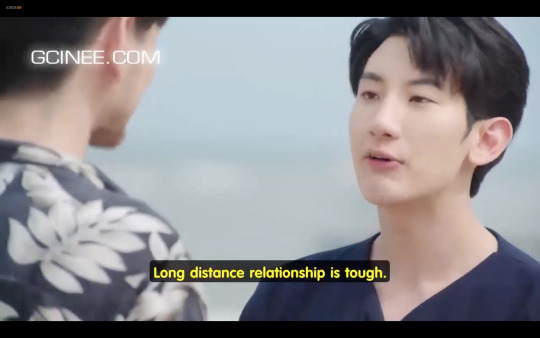
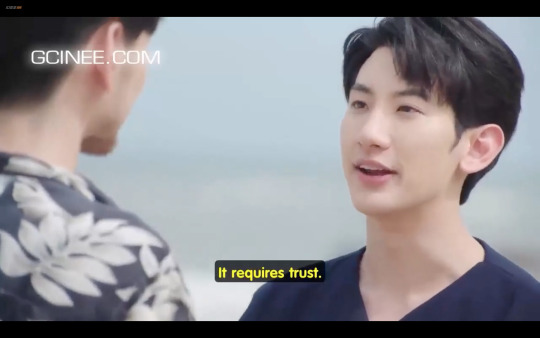
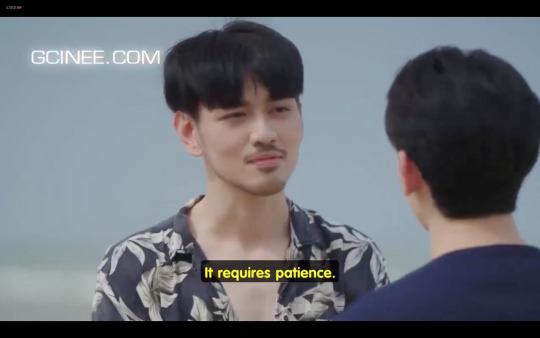
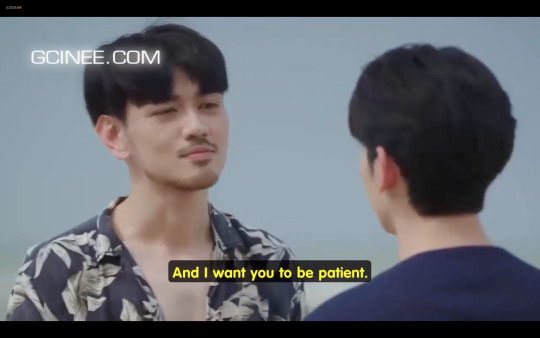

I think about this scene against the structure of the short series that is Still 2gether, which is centered around the protagonists of Sarawat and Tine being temporarily separated as they prepare to compete in a university-wide tournament. Sarawat has the most lovely contemplation on love during this separation, and even Aof Noppharnach himself admits that the glance that Sarawat and Tine give to each other as they pass each other in the lead-up to the ultimate tournament is his favorite scene he's ever filmed (!!!) (and that scene is sooooo reminiscent of Pran's and Pat's pinky-hold after their public "break-up").
In other words: Still 2gether is ALL about separation, and contemplating the strength of love relationships in the face of those separations. While Sarawat and Tine will get back together, after that tournament -- Type and Man are separated for the foreseeable future. There is no end indicated to the patience that Type wants from Man. The conversation is just, THERE, and hanging -- there's an acknowledgment that long-distance relationships are tough, but Type isn't offering to quit his job and move back to Bangkok. Instead, Type and Man are left to accept the reality that there is no end in sight to their separation.
And I think this was incredibly bold of Aof Noppharnach to include in a GMMTV BL that otherwise ended happily for Tine and Sarawat, the main protagonists. What I admire about Aof's works are these sly inclusions of open-ended, sometimes melancholy non-resolutions, either for his main or his support characters, that leave us as viewers often slightly unsatisfied or unfulfilled. He did this in particular with the character of Aof in Gay OK Bangkok, a web series that he screenwrote in 2016; and many might say that Pran being away in Singapore is also not the most satisfying of endings for our beloved PatPran in Bad Buddy. To me, these decisions to do this artistically are just incredibly reminiscent, again, of the kind of pain that we as Asians have been culturally attuned to accept, for the sake of economics, and/or for the sake of the betterment of our loved ones.
Besides economic separations in Aof Noppharnach's works, we also have separations related to family demands and desires. In A Tale of Thousand Stars and Our Skyy 2 x A Tale of Thousand Stars, we see Tian leaving Phupha's side for two years to study for a graduate degree at Tian's mom's insistence; and we see Phupha refusing to join Tian, after Tian has graduated and moved back to Pha Pun Dao, on trips Tian takes back to Bangkok to celebrate his birthday with his parents.
When I rewatched ATOTS earlier this year, I noted that both Phupha and Tian were remarkably bad communicators throughout the original series -- and I posited that, in large part, their terrible communication was borne out by way of the both of them being raised in traditionally masculine Asian households that seemed to not allow for leeway regarding emotional revelations. BOTH Phupha and Tian were expected and intended to follow in the footsteps and demands of their family members. To the end of the ATOTS storyline in Our Skyy 2, Phupha brings up his parents -- and he hears what he has been wanting to confirm from Tian's parents, in their desire to have Phupha take care of Tian for the rest of their lives.
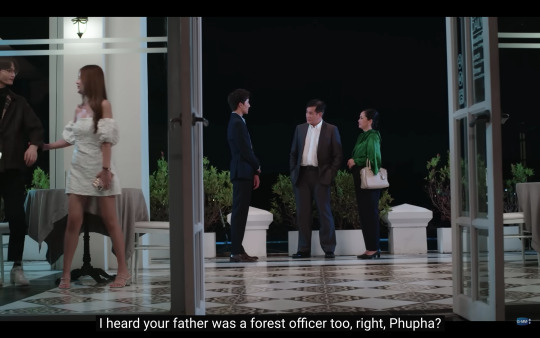

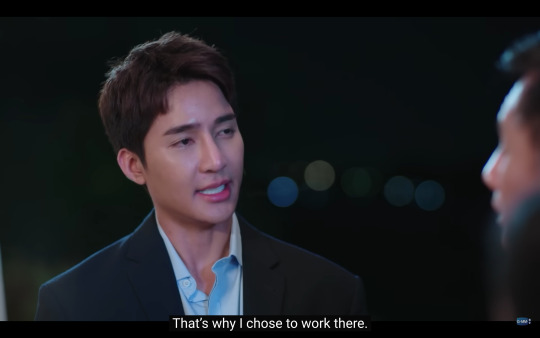
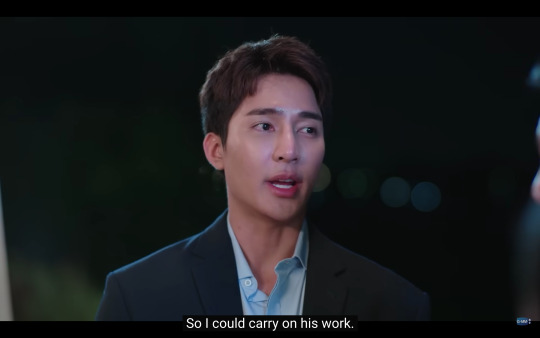
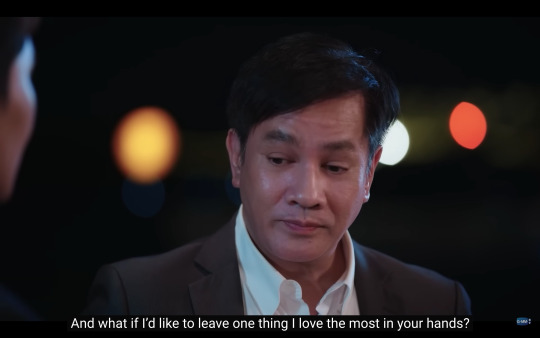
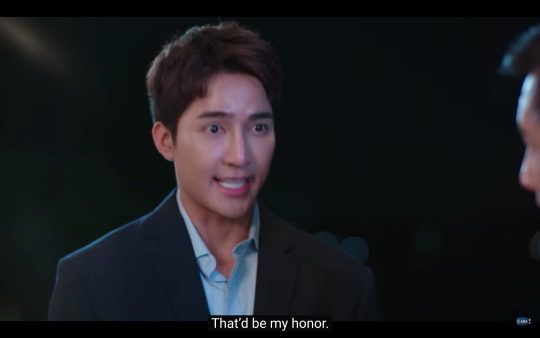
Phupha in particular needed to have multiple gateways opened to him, vis à vis Tian's family, in order to properly and openly confirm his permanent love and commitment to Tian. If Phupha didn't have that? He was willing to be separated from Tian, either temporarily, or at length. Phupha needed a kind of culturally accepting door opened to him -- as a man raised in what we assume to be a rural and traditional environment that may very well have not allowed for a gay man to live openly and honestly. Phupha indeed follows in his father's footsteps, to the extent of never leaving Pha Pun Dao, and demanded that he have Tian's family's approval before making the final commitment to Tian to love Tian forever.
I find the cultural nuances of nuclear family separation, or separation encouraged by nuclear family, to be particularly heartbreaking in many of Aof Noppharnach's works. We know that Jim and Jam, brother and sister in Moonlight Chicken, ran away from their Isan hometown as youths to find their lives in Pattaya, where we meet them in the context of that show. But separation either from nuclear family, or more impactfully, done by nuclear family, is most evident in Bad Buddy.
Besides Pran voluntarily leaving for Singapore, we know that Pran has been involuntarily separated from Pat before -- when Pran was transferred to a boarding school in 10th grade by his mother, Dissaya. Before that transfer, Pran and Pat were technically "separated" by their parents in so far as they were not supposed to become friends -- all while competing heavily against each other in every category of life.
That boarding school transfer? That wasn't just separating Pran from Pat. What I found remarkable about that separation during my recent BBS rewatches is that Dissaya HERSELF chose to be physically separated from her own son, for the sake of her rivalry with Pat's father, Ming.
I'm thinking about this particularly from the words she used with Pran as they sat at breakfast together before Pran started his second year at university, when Dissaya said that Pran could date anyone, men or women, as long as he "didn't date [the next door kid]."
My interpretation of that perspective is that Dissaya did not want Pran to relieve the heartbreak that she herself experienced when she was close with Ming in her teenage years.
In other words: she chose to send her son away in the face of her ongoing, lifelong fear that Ming and his family would once again wreak havoc on her and her clan.
In the continuation of the intergenerational trauma wrought upon Pat and Pran by their parents -- as a mother myself, this seems to be particularly egregious. Dissaya would have rather had her son AWAY FROM HER, than to contemplate her son even being WITHIN physical proximity to Pat in the context of her hatred of Pat's father, Ming, and the fear that she had that the Jindapats would negatively influence the Siridechawats again.
(The wonderful @telomeke reminded me, in conversation on this topic, that the first question Dissaya asks Pran, after learning about the first faculty fight in episode 1 when Pran re-encounters Pat for the very first time, was, "Did he hurt you, Pran?" Dissaya cannot bear to allow the Jindapats to hurt her son, or her family, ever again.)
I wrote in my first Big Meta on pain and suffering that Asian parenting expectations and mores are far more conditional than they are in the West, as parenting mores in the West are centered around unquestioned and unconditional love from parents to children. So much of Bad Buddy meta out there focuses on the internal experiences of Pran and Pat. When I sat back to think about Dissaya making the decision for herself to be separated from her son for years -- and then to also contemplate pulling Pran FROM COLLEGE when she learns that Pat goes to Pran's university -- I mean. We know Dissaya and Ming both tried their best to embody their hatred of each other into their children. But Dissaya takes it a couple steps further, by attempting to literally control Pran's physical existence vis à vis Pat, which -- and I'm going to sound like a judgmental Westerner here, even as an Asian -- strikes me as out of line by way of just pure emotional projection onto one's children.
When Pran goes to Singapore, at the end of the series, it's out of his own volition. Again, I'll write more about this at the end of my BBS OGMMTVC meta series. But what he experienced by ways of many TYPES of separation from Pat throughout his life -- competitively, emotionally, and then physically -- are extensive. He was physically separated from Pat by Dissaya. He was theoretically "separated" from Pat emotionally, by being discouraged in having a friendship with Pat. He is physically separated from Pat *again* when he goes to Singapore. And I posit later in this piece that Pat and Pran had another theoretical "separation" when they are pretending to be broken up throughout the course of their relationship.
When I think about what teenage Pran must have felt to be *physically sent away* -- BY and FROM his own family, for their sake of his family's desires to avoid ANOTHER family -- it explains a hell of a lot more about Pran's tendency to dissociate, particularly during stressful times. (We see this when he's alone at the demolished bus stop, and cutely in Our Skyy 2, as Pat encourages a grumpy Pran to go to Pha Pun Dao.)
And where Pat balanced Pran out -- where Pat could offer the kind of companionship, and relaxed and equitable communication that Pran had never had with his family -- was where Pran could finally experience truly open and SAFE love from and with another person, another person who wouldn't *send him away* if Pran didn't play by their rules. Instead, Pat fought by Pran's side, and Pran was willing to fight, too, and they remained together, and safe in their love and trust.
Whew. Dissaya separating Pran from his own family, from herself -- to leave him alone at boarding school -- seriously punches me in the gut, especially as a mother myself. I'm thinking about a teenager, on the cusp of adulthood, alone to contemplate his unending love for Pat, and I'm like.... I wouldn't leave a kid alone like that for a moment. But for Dissaya, her husband, and their pride? It seemed to be a worthwhile decision in that moment. A decision that we know would blow up in their faces in episode 10 of Bad Buddy.
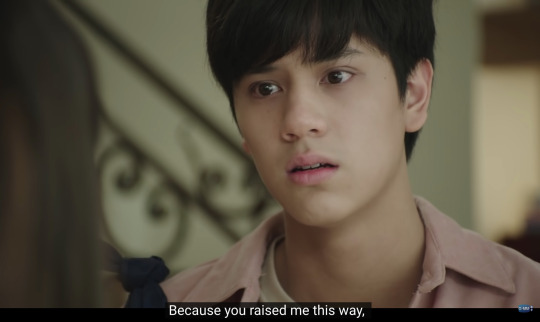
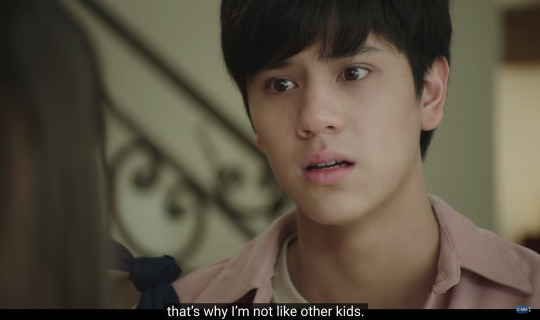
In Pran's first separation from Pat -- Pran did not have personal agency. He did have agency later on, as he moved to Singapore, which again, I'll contemplate in a further meta.
Two instances where I was impressed by protagonists leveraging their agency vis à vis temporary separations from their partners was in Until We Meet Again and in I Promised You The Moon.
UWMA's Pharm was first and foremost presented as a blushing maiden. HOWEVER: Pharm demonstrated quite a bit of sexual agency early in the series. He was forward in his crush on Dean. He contemplated openly being gay. And he wasn't afraid to push Dean away when Dean was moving too fast sexually.
At the end of the series, after Dean and Pharm have resolved their spiritual connection vis à vis the embodied spirits of Korn and Intouch meeting once more -- Pharm wants to know if the love between him and Dean is real, and independent of the influence of the spirits of Korn and Intouch. So: Pharm asks for a break.
Throughout UWMA, Dean is the obvious seme, and Pharm is the blushing uke. I squealed in DELIGHT when I first watched Pharm asking for the break. Yes, Pharm loved Dean -- and what I saw in Pharm's asking for a temporary separation was truly out of that love, to confirm between the both of them that their relationship was very much indeed a forever relationship. God, I get chills thinking about it: Pharm was safe enough in his sphere with Dean to ask for and to GET the agency-driven space that HE NEEDED to feel fully confident in the relationship. That was a risky move that paid off for the two guys in dividends in the end. Dean had no choice but to say yes there.
The fabulous Oh-aew in I Promised You The Moon goes even further than Pharm. He fucking breaks up with Teh! After Teh cheated on Oh-aew! YES, HOMEY, YES! No wibbling on Oh-aew's end. Oh-aew was devastated, yes. But he knew he had to have Teh out of his life in that moment, for the sake of Oh-aew's own happiness, growth, and development. He even rejects Teh's reach-out at the end of their college careers.
What stuck me as so golden about the ending of IPYTM was that that break-up wasn't actually presented as temporary. They were apart for OVER A YEAR (thank you kindly to @shortpplfedup for the temporal fact-check!). Oh-aew held his ground. He needed his time and space. He needed to grow! And he valued that, individually.
I'm celebrating these two instances of agency-driven separations because of the style of their intention vis à vis the protagonists asking for, needing, and leveraging these separations. With the economic and involuntary separations I talked about earlier -- it's like there was a higher need, whether it was for money, a better career opportunity, fear, or selfishness on the part of a family to create the separation.
With Pharm and Oh-aew: the separations they demanded were purely personal and for their own growth. We know now that Pharm and Oh-aew get their endings with their partners. Pharm has a purely happy ending with Dean in Between Us. Oh-aew's ending with Teh is open-ended -- we don't know what chaos Teh will wreak next -- but at least we know they're navigating that chaos together again.
The last drama I wanted to take a look at regarding pain, trust, and separation is the fabulous movie continuation of Cherry Magic: 30 Years of Virginity Will Make You a Wizard?! (I always love writing ?! whenever I talk about Cherry Magic, lol).
The central separation in the movie of the two protagonists, Adachi and Kurosawa, comes about when Adachi is transferred to Nagasaki for work. As @neuroticbookworm and @lurkingshan can attest to: a Western viewer of Japanese BLs will often find themselves screaming to a screen, "JUST TALK ALREADY!," and a uniquely common aspect of Japanese doramas is that so much of communication in Japanese culture is silent, unsaid, kept internal by collectivist social pressures to not make waves with another person -- which automatically creates ongoing questions of trust between partners. When Adachi (Akaso Eiji) shares with Kurosawa (Machida Keita) that Adachi will be moving, Kurosawa shares in words that he's happy for Adachi, but through very simple body language, communicates that he is feeling otherwise.
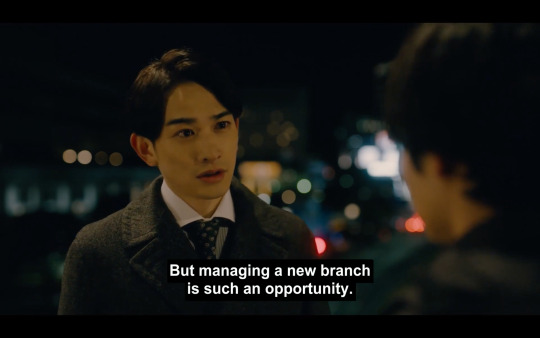
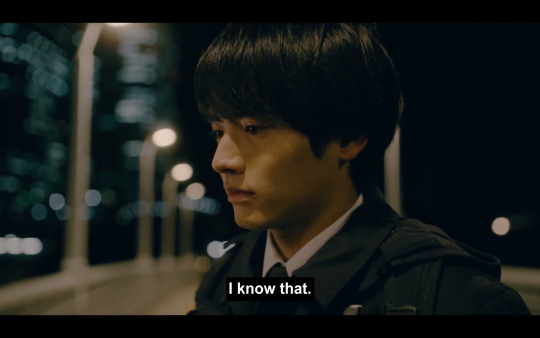
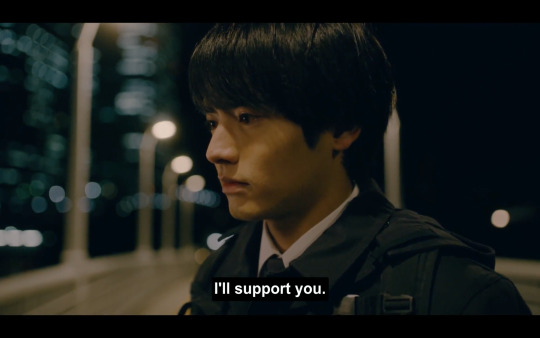
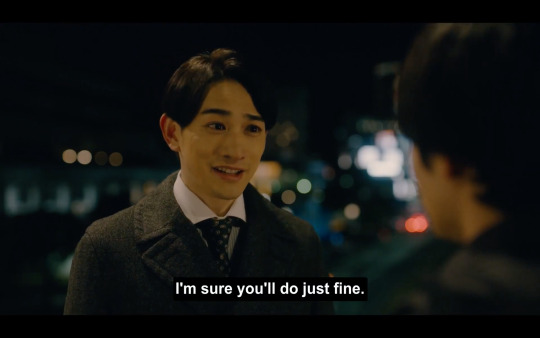
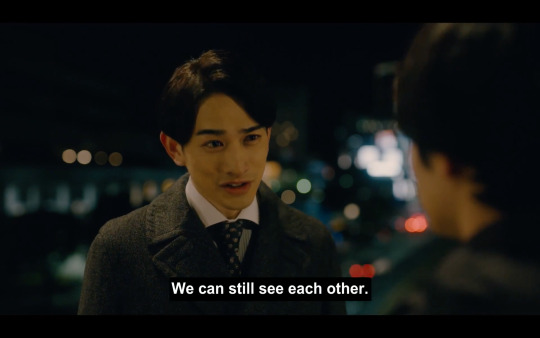
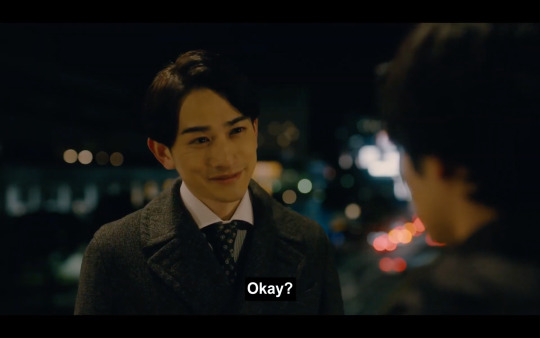
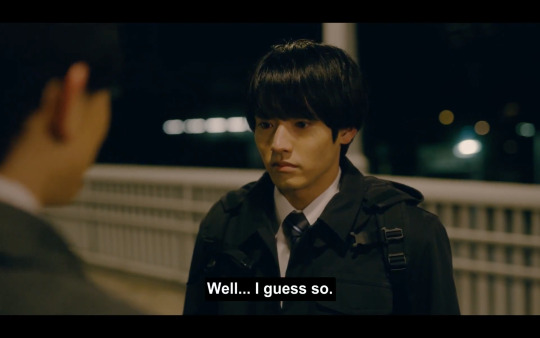
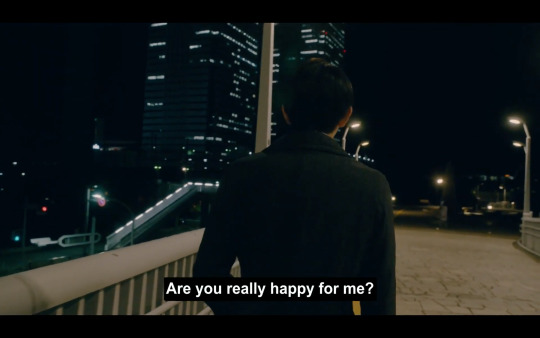
Later in the movie, Adachi gets into an accident in Nagasaki, and Kurosawa rushes to be by Adachi's side. Kurosawa is clearly traumatized. And Kurosawa finally reveals his feelings about the entire situation -- a rare display of direct emotional confession.


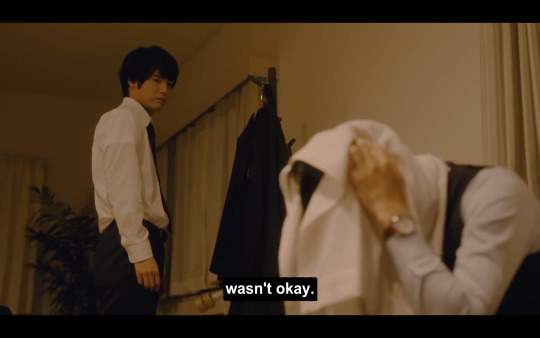
We think that Adachi moved to Nagasaki for this job opportunity -- separating himself from the incredibly devoted and head-over-heels-in-love-with-Adachi Kurosawa. Adachi knows well enough that Kurosawa is suffering in this separation. But later in the movie, after Adachi has moved back with Kurosawa, do we learn Adachi's true intentions. Adachi wants to make himself invaluable at work -- so that Adachi's and Kurosawa's shared company will not separate them if the company finds out about their relationship.
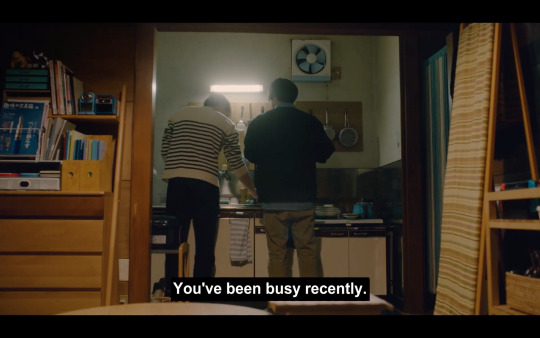

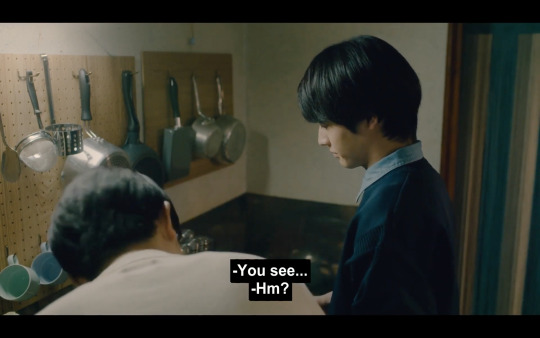
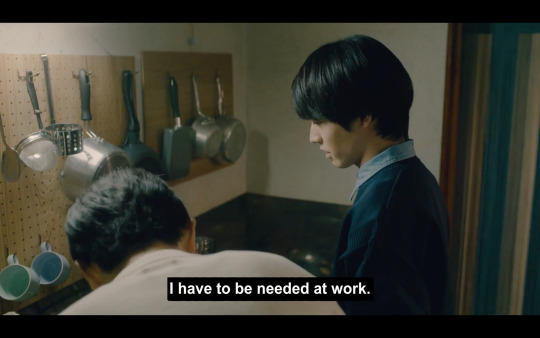

This particular conversation between Adachi and Kurosawa -- after their separation, after they've moved in together -- is a huge turning point in the movie for Adachi, who had usually been the reluctant uke in their relationship prior to this moment. In this conversation, Adachi expresses his fear that outside forces will eventually separate them, and he wants to do what he can to ensure the safety of their relationship.
To me, this is incredibly reminiscent of the compromises Pran and Pat make in Bad Buddy to keep their relationship secret -- another theoretical "separation" -- from their parents for the health, safety, and viability of their relationship.
As well, this conversation between Adachi and Kurosawa moves forward into Adachi's desire to come out to their families. He was inspired by the immediate aftermath of the accident, in which Kurosawa was the last person to find out that Adachi had gotten hurt -- only after Adachi's family and company were notified.
The nuances of this separation between Adachi and Kurosawa -- and what the separation LED TO, which was an eventual and permanent commitment between Adachi and Kurosawa -- are incredibly layered. Adachi made an economic separation from Kurosawa. But it was also rooted in his desire to acclimate his company to his company's dependence on Adachi, so that the company would choose Adachi's contribution to the company over the potentially taboo reality of his same-sex relationship with a colleague in Kurosawa. In other words: he wanted to leverage the separation and his work performance upon his return, to render the company no choice in choosing Adachi's economic performance over his personal and private choices.
(One insight into Japanese culture is that for decades, Japanese corporations have wanted their employees to be married, to complete a seamless connection between household and "office" families. The Japanese BL Kinou Nani Tabeta?/What Did You Eat Yesterday? makes reference to the fact that the main protagonist, Shiro, becomes an independent lawyer because, as a gay man, he may have been pressured to take a wife in another, more group-oriented corporate setting.)
AND, following this, Adachi wanted to come out to his and Kurosawa's families, to also acclimate them to their relationship, so that their families would also not threaten the sanctity and safety of their relationship. And his gamble worked -- and their families accepted them, and they were able to make a permanent commitment to each other.
Without a strategically economic separation, Adachi and Kurosawa could not have achieved key moments of communication that led to their ability to find safety in their external environments, and make a personal and private permanent commitment to each other. The separation to Nagasaki was Adachi's lever to move their relationship forward.
It's so nuanced, so layered, and so strategic on Adachi's end, to use the work separation and his commitment to his company as such a motivator to propel his relationship forward and permanently with Kurosawa -- especially vis à vis the unique nuances of spoken and unspoken communication in Japanese society, which are remarkably different than the styles of communication we see in Thai dramas.
In Pran's and Pat's conclusion in the Thailand of Bad Buddy, they go in the opposite direction: for the sanctity and safety of their relationship, they act out a break-up scenario (with Dissaya telling Pran, "come back to your family," ha), and keep their committed relationship a secret. And this happens *two years* before the context of an actual, physical separation when Pran decides to move to Singapore after graduation.
It's a bit of a switcheroo from what we'd expect by way of open vs. closed communication between Japan and Thailand. But both scenarios, from Cherry Magic to Bad Buddy, work brilliantly well to ensure that all relationships are safe and solidified.
I'm not sure that I can say, globally, that separation from one's nuclear family, or separation from a partner, are common occurrences in manifested everyday reality. As I mentioned before, the economies of many countries are dependent on the physical separation of their citizens to other locales to send back monetary remittances. But more often than not -- when partners are partnered, they tend to want to stay by each other's sides.
I love that many Asian dramas do not shy away from the many realities as to why partners or children may be voluntarily or involuntarily separated from loved ones. Our beloved dramas show us the devastation of involuntary separations, as rendered by Dissaya unto Pran. We see that economic separations can actually LEAD to a solidifying of relationships in the case of Adachi and Kurosawa. We see that family-motivated separations, in the cause of Phupha and Tian, simply needed the investment of time for their relationship to reach a point of comfortable commitment. We see that agency-driven separations by Pharm and Oh-aew can lead to emotional clarity. And, we see that theoretical, secret-kept "separations," of the kind that Pat and Pran created for themselves, to protect their relationship, were risks worth taking, simply for them to be together and happy.
Pain and happiness are not emotions independent of each other. At least in the eyes of my Asian cultures, human beings embody all emotions, all the time. Humans are certainly primed, internally and socially, to seek happiness and balance. But as I've posited here in this post -- is there pleasure without pain? The pain of separation, the trust that partners and family members can learn from each other through separation, and the lessons and communicative ability to solidify relationships after the obstacles of separation, are all themes of life that, I think, are worth unwinding on, in glorious emotional detail. And I love that our beloved Asian dramas do not shy away from these examinations.
(Tagging @dribs-and-drabbles and @solitaryandwandering by request! If you'd like to be tagged, please let me know!)
[Well, this one was a doozy -- if you got through it all, I thank you! Next up, next week, is another post I've been dying to write for months. I had the opportunity to engage in lengthy conversation with a number of FABULOUS Asian Tumblr bloggers, all of us Bad Buddy stans, to reflect on our experiences as Asian reviewers watching BBS and to talk about what we related to. I have a list, a WHOLE LIST! of themes to expound on. I'm calling it Asian Cultural Touchpoints Within Bad Buddy. And I may need to split it into two posts, because there's a lot to talk about. Join me and my friends next week in our continued Bad Buddy brain-rot sesh!
Here is the status of the Old GMMTV Challenge watchlist. Tumblr's web editor loves to jack with this list; please head on over to this link for the very latest updates!
1) The Love of Siam (2007) (movie) (review here)
2) My Bromance (2014) (movie) (review here)
3) Love Sick and Love Sick 2 (2014 and 2015) (review here)
4) Gay OK Bangkok Season 1 (2016) (a non-BL queer series directed by Jojo Tichakorn and written by Aof Noppharnach) (review here)
5) Make It Right (2016) (review here)
6) SOTUS (2016-2017) (review here)
7) Gay OK Bangkok Season 2 (2017) (a non-BL queer series directed by Jojo Tichakorn and written by Aof Noppharnach) (review here)
8) Make It Right 2 (2017) (review here)
9) Together With Me (2017) (review here)
10) SOTUS S/Our Skyy x SOTUS (2017-2018) (review here)
11) Love By Chance (2018) (review here)
12) Kiss Me Again: PeteKao cuts (2018) (no review)
13) He’s Coming To Me (2019) (review here)
14) Dark Blue Kiss (2019) and Our Skyy x Kiss Me Again (2018) (review here)
15) TharnType (2019-2020) (review here)
16) Senior Secret Love: Puppy Honey (OffGun BL cuts) (2016 and 2017) (no review)
17) Theory of Love (2019) (review here)
18) 3 Will Be Free (2019) (a non-BL and an important harbinger of things to come in 2019 and beyond re: Jojo Tichakorn pushing queer content in non-BLs) (review here)
19) Dew the Movie (2019) (review here)
20) Until We Meet Again (2019-2020) (review here) (and notes on my UWMA rewatch here)
21) 2gether (2020) and Still 2gether (2020) (review here)
22) I Told Sunset About You (2020) (review here)
23) YYY (2020, out of chronological order) (review here)
24) Manner of Death (2020-2021) (not a true BL, but a MaxTul queer/gay romance set within a genre-based show that likely influenced Not Me and KinnPorsche) (review here)
25) A Tale of Thousand Stars (2021) (review here)
26) A Tale of Thousand Stars (2021) OGMMTVC Fastest Rewatch Known To Humankind For The Sake Of Rewatching Our Skyy 2 x BBS x ATOTS (re-review here)
27) Lovely Writer (2021) (review here)
28) Last Twilight in Phuket (2021) (the mini-special before IPYTM) (review here)
29) I Promised You the Moon (2021) (review here)
30) Not Me (2021-2022) (review here)
31) Bad Buddy (2021-2022) (thesis here)
32) 55:15 Never Too Late (2021-2022) (not a BL, but a GMMTV drama that features a macro BL storyline about shipper culture and the BL industry) (review here)
33) Bad Buddy (2021-2022) and Our Skyy 2 x BBS x ATOTS (2023) OGMMTVC Rewatch (The BBS OGMMTVC Meta Series is ongoing: preamble here, part 1 here, and more reviews to come)
34) Secret Crush On You (2022) [watching for Cheewin’s trajectory of studying queer joy from Make It Right (high school), to SCOY (college), to Bed Friend (working adults)] (watching)
35) KinnPorsche (2022) (tag here)
36) KinnPorsche (2022) OGMMTVC Fastest Rewatch Known To Humankind For the Sake of Re-Analyzing the KP Cultural Zeitgeist
37) The Eclipse (2022) (tag here)
38) The Eclipse OGMMTVC Rewatch For the Sake of Re-Analyzing an Politics-Focused Show After Not Me
39) GAP (2022-2023) (Thailand’s first GL)
40) My School President (2022-2023) and Our Skyy 2 x My School President (2023)
41) Moonlight Chicken (2023) (tag here)
42) Bed Friend (2023) (tag here)
43) Be My Favorite (2023) (tag here)
44) Wedding Plan (2023)
45) Only Friends (2023) (tag here)]
#bad buddy#bad buddy the series#bad buddy meta#bad buddy the series meta#backaof noppharnach#aof noppharnach#nanon korapat#ohm pawat#ohmnanon#patpran#pran x pat#pat x pran#still 2gether#a tale of thousand stars#atots#our skyy 2 x bad buddy x a tale of thousand stars#cherry magic#cherry magic the movie#until we meet again#i promised you the moon#i told sunset about you#ipytm#itsay#moonlight chicken#the bbs ogmmtvc meta series#turtles catches up with the essential bls#turtles catches up with thai bls#turtles catches up with old gmmtv#the old gmmtv challenge#ogmmtvc
74 notes
·
View notes
Text
The comedic potential of Pat and Pran bonding with Phupha and Tian but forgetting to mention the fact that they're pretending to be exes and have this massive rivalry thing so that when they put on the play and Phupha and Tian come to watch it, they're completely blindsided by the fact that Pat and Pran are acting like they're each other's public enemy #1
#phupha and tian: cant wait to see what those young lovebirds did with protraying our story#pat and pran: *about to punch each other*#phupha and tian: what did we miss#bad buddy#a tale of a thousand stars#atoats#our skyy 2#our skyy#bbs
175 notes
·
View notes
Text

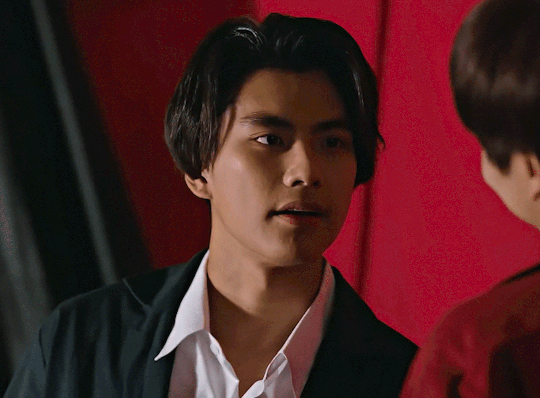
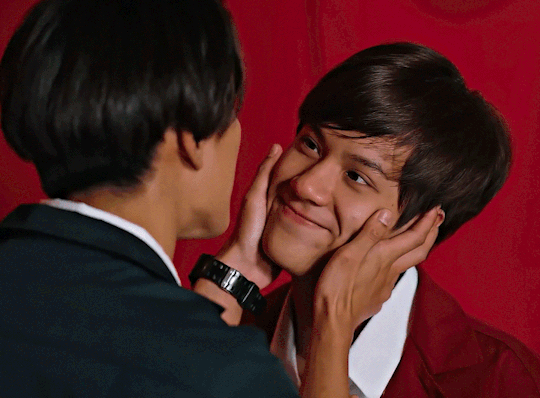

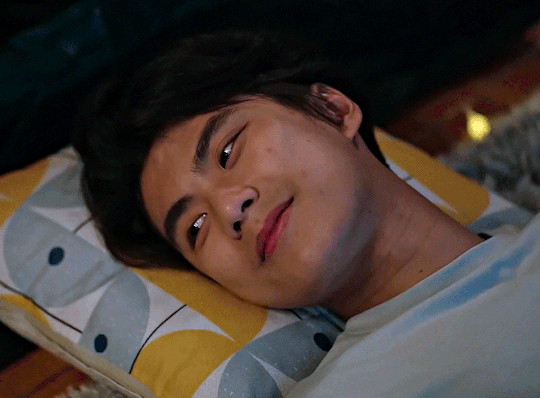

#some things never change
#bad buddy#our skyy x bad buddy#our skyy 2#bb#thai drama#asianlgbtqdramas#asian drama#thai bl drama#thai bl#nanon korapat#ohm pawat#patpran#pranpat#pat x pran#gmmtv series#vx:gifs#vx:tv:bb#well these look dreadful ngl#i have forgotten how to do clean gifs it seems
258 notes
·
View notes
Photo


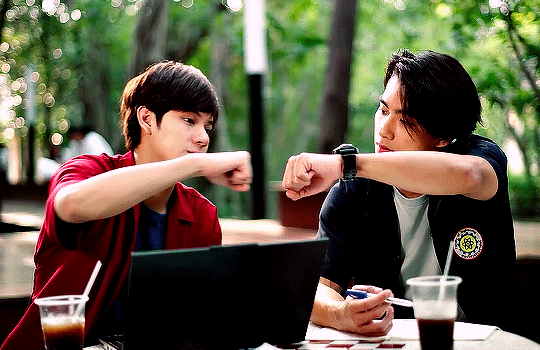

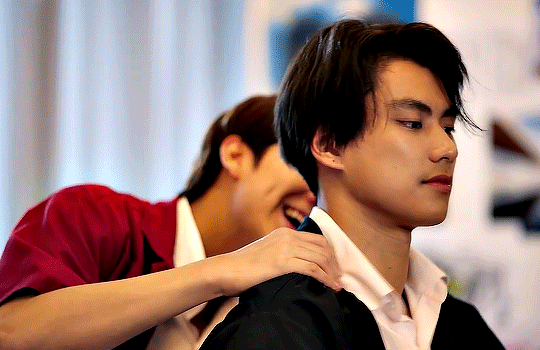
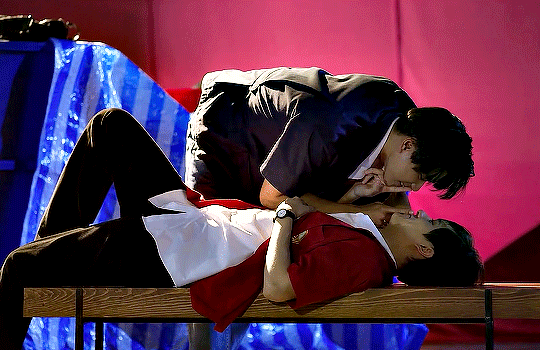
Pat Napat Jindapat and Pran Parakul Siridechawat in Our Skyy 2 X Bad Buddy Preview
#our skyy 2#bad buddy#bad buddy series#os2:bb#ohm pawat#nanon korapat#userdramas#asiandramasource#asiandramanet#asianlgbtqdrama#asianlgbtqdramas#vishingwell#uservid#userjjessi#becauseigtf#usernuria#tusersilence#mine#my gifs#mine:bb
316 notes
·
View notes
Text
Random BL Superlatives: 2023
Well @lurkingshan did it, so I must do it. So here are some random, WKA themed superlatives for the 2023 BL selection.
Best Hands: Mhok and Day, Last Twilight
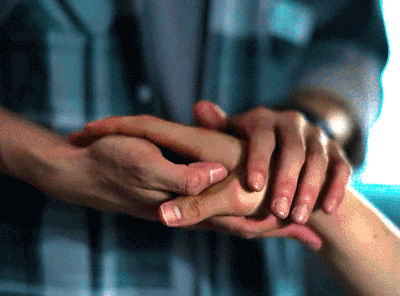
gif by @singularities
Listen. I know. I KNOW. There are so many incredible options, and I have written at length about a number of them. I mean come on, La Pluie is right there, I Feel You Linger in the Air is right there, Sing My Crush, Moonlight Chicken etc. etc. etc. But
But, Last Twilight came in with the steel chair right at the end of the year here with that FUCKING HANDSING SCENE. Can you blame me? The handsing scene is shrimply too powerful.
Best Lighting: Playboyy
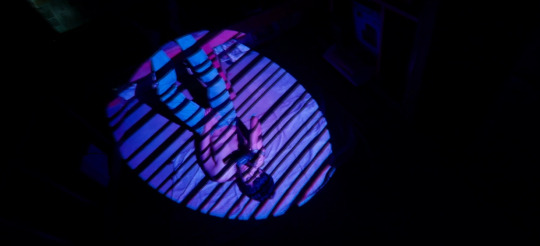
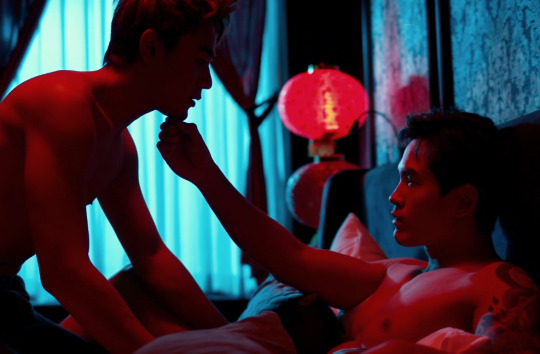
You know, it's funny cause I don't usually end up writing about lighting in shows, despite the fact that lighting design is absolutely one of my favorite things in film, stage, and television. Chains of Heart has really interesting lighting too, but Playboyy is an objectively better show, and it is doing some absolutely gorgeous lighting design.
Best Sex Scene: Olive Oil, I Feel You Linger in the Air
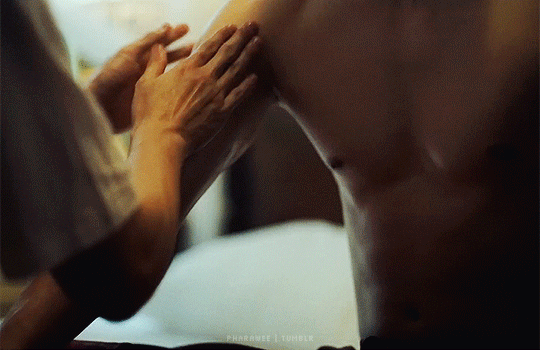
gif by @pharawee
THE OLIVE OIL SCENE, WHY ARE THERE NO GIFSETS OF THE OLIVE OIL SCENE? WHY IS TUMBLR SUCH A FUCKING HATER???? They didn't even fuck in that scene, but holy mother of GOD it was the best thing I've seen all year. I Feel You Linger in the Air has some of the most inventive and beautiful intimate moments, and spreading the olive oil as a stand in for arousal and masturbation was absolutely goddamn brilliant.
Best Faen (Non)Fatale: Porjai, Last Twilight

gif from @khaopybara
I know Last Twilight hasn't finished yet and will take us in to 2024, but Porjai and Mohk's relationship is absolutely my favorite lovers to friends dynamic I have seen this year. I was showering praise upon them all for this in the tags of a reblog today, so I have to give it to them. Massive shout out and extremely close call to Nara from La Pluie.
Best Emotional Roller Coaster: What Did You Eat Yesterday? Season 2
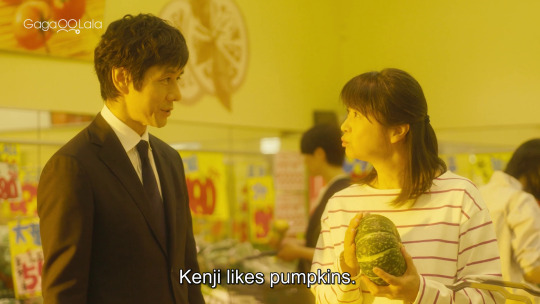
Ok there were quite a lot of shows that I think would have applied here, but man oh man this entire season has just run me through the wringer with how much Shiro has grown over the course of the last two seasons. Episode 11 had me laughing my ass off, and then absolutely sobbing by the end. So it's going to Kinou Nani Tabeta?
The Shirt I Want to Steal Most from Wardrobe: Blue and White Button Up, The Sign
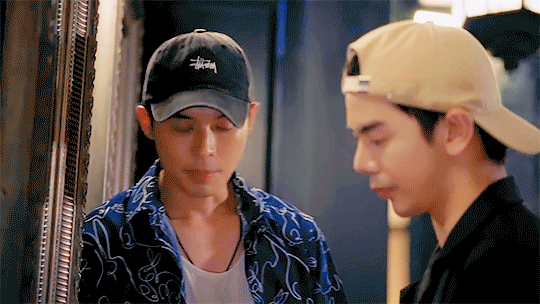
gif from @ohshinytrinketsmine
I know this will be contentious when the Fart Proudly shirt is right there, but I really loved the blue and white button up shirt that Phaya wore I do not know what is in the water at IdolFactory, but they have hands down some of the best shirts I have ever seen. When I watched Secret Crush on You I wanted the entirety of Sky's wardrobe, now I am having shirt envy for this sexy little blue-with-white-lines-that-are-vaguely-rabbit-shaped (wka do not write a post about rabbits, do not write a post about rabbits-) button up.
The Character Who Most Changed my Opinion of Them: Phupa, OS2 x BBS x ATOTS
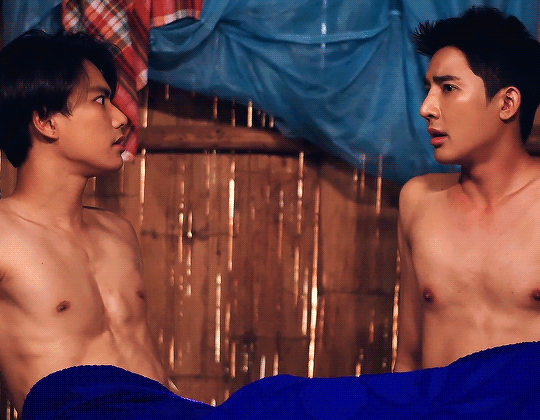
gif by @alexshenry (double PhupaPat whammy for @waitmyturtles)
Okay, so to tell you the truth, I made new superlatives cause if I took the superlatives from @lurkingshan's post it would have been at least half the same if not more (because as always, Shan is right about everything). But, I will put an overlap here because I absolutely could not let this year go by without applauding Aof, Earth, and Phupa for really putting in the work to help me understand this man better.
The Show That Most Surprised Me: Wedding Plan by MAME
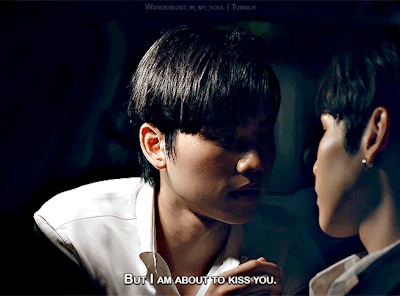
gif by @wanderlust-in-my-soul
Okay not only was this show that I absolutely was not planning to watch or initially interested in actually one of the best of the year, but it was also a MAME show. And a lot of us have our critiques of MAME's writing, but this was so outside of her typical MO that I am shocked it came from the same writer. Love Sailom, love a Lavender Wedding, love Nuea, love it all.
The Trope This Year That Most Accounted for the Fact These Are Gay MEN: Boxing! Sing My Crush, Wedding Plan, The Sign
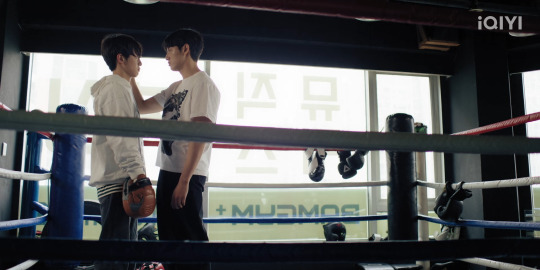
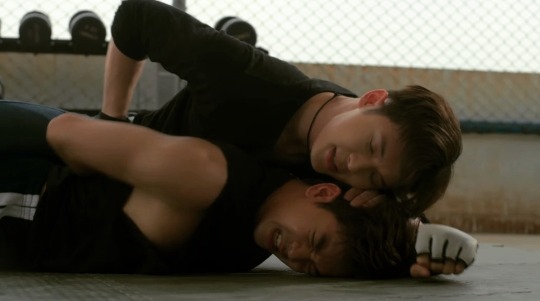
Sing My Crush did this the absolute best, but I really genuinely loved that multiple shows this year let men fight in controlled settings to get out some of their frustration and to process their feelings. Han Ba Ram crying in the gym? One of my favorite scenes of the entire year.
And yeah sure, Phaya and Tharn are fighting for the intricate rituals that allow men to touch the skin of men, we get the horny vibes, but fundamentally this fight does occur because Tharn is angsty and ignoring Phaya and that cannot stand. I like seeing Phaya sparring with the punching bag at the end of the most recent episode as well because he's fucking furious about Tharn telling the doctor about his dreams. I love it, I love it so much.
#bl superlatives#last twilight the series#playboyy the series#i feel you linger in the air#what did you eat yesterday?#kinou nani tabeta?#the sign the series#our skyy 2 x bbs x atots#a tale of a thousand stars#sing my crush the series
154 notes
·
View notes